#daughter of francis i of the two sicilies
Text

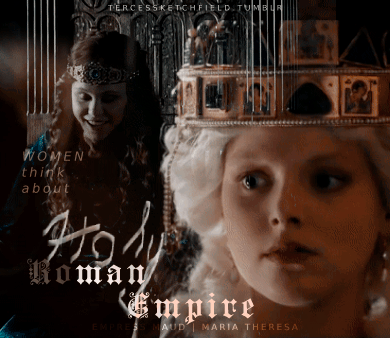
MEN THINK ABOUT ROMAN EMPIRE. WOMEN THINK ABOUT HOLY ROMAN EMPIRE
JUDITH OF BAVARIA (797-843) — Daughter of Count Welf I of Bavaria, Judith was a Carolingian Empress as the second wife of Louis I the Pious. Mother of Gisela and Charles the Bald, she foght for both her own influence at court and for the succession of her son over the claims of his elder half-brothers, the sons of Louis I from his first marriage. Charles became the Emperor in 875, after the death of Louis II, his nephew and a son of his half-brother Lothair / fancast: Annabel Scholey
MARIA OF AUSTRIA (1528-1603) — Daughter of Charles V, Holy Roman Emperor, and Isabella of Portugal. She served as Regent of Spain both jointly with her husband, Maximilian (before their accession to the imperial throne), and in person, for her father, and brother, Philip II. Her children include two Holy Roman Emperors, Rudolf II and Matthias, over whom she held great influence, and queens consorts of Spain, and France / fancast: Olivia Cooke
EMPRESS MAUD (1102-1167) — Daughter of Henry I of England and Matilda of Scotland. Her first marriage to the Holy Roman Emperor, Henry V, gave her the title under which she came down into history, and was a source of great pride to Maud. Rightful heiress of Henry I, she confronted her cousin, King Stephen, in the civil war, known as the Anarchy, fighting ferociously for her rights. She failed in this for herself but won for her son Henry, who became king and established the Plantagenet dynasty in England / cast: Alison Pill in The Pillars of the Earth (2010)
MARIA THERESA (1717-1780) — She succeded her father Charles VI as the ruler of Habsburg monarchy in 1740, and devoutedly defended it against its enemies in the War of Austrian Succession and the Seven Year's War. Wife of the Holy Roman Emperor, Francis I, she was a forceful personality and a competent ruler herself, reigning first in her own right, and later, jointly with her son Empreror Joseph II. Her children include two Holy Romam Emperors (Joseph II and Leopold II), queens consorts of Naples ans Sicily, and France / cast: Marie-Luise Stockinger in Maria Theresia (2017)
#historyedit#judith of bavaria#maria of austria#empress maud#empress matilda#maria theresa#maria theresia#perioddramaedit#history#women in history#perioddramasource#onlyperioddramas#tusereliza#userbennet#usermina#weloveperioddrama#cortegiania#perioddramagif#gifshistorical#my edit#*i have literally zero idea what is this lmao* but i really like it idk
137 notes
·
View notes
Text
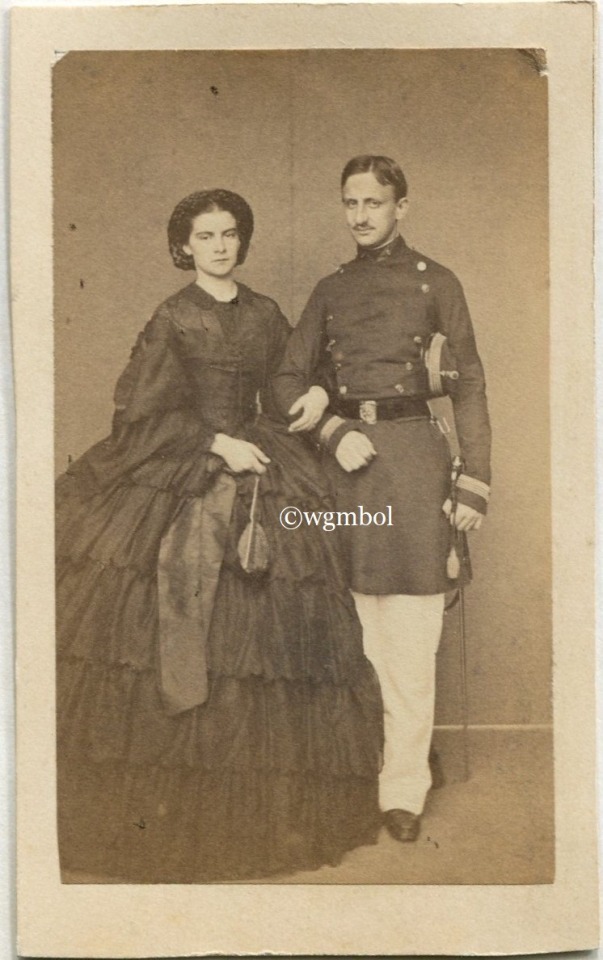
Francis II and Marie Sophie, last King and Queen of The Two Sicilies. A carte de visite photograph by Alphonse Bernoud, Naples 1959. From my own collection.
Queen Marie Sophie of The Two Sicilies in 1924.
I found this interview with Marie Sophie online, it's in Italian so I google translated it. Far from perfect!! But it gives some interesting info on our Queen one year before her death.
Posted by Giuseppe Grifeo on 19 February 2022, grifoneartigliopenna.com.
Interview with Her Majesty Queen Maria Sofia
Published in Corriere della Sera in November 1924.
by Giovanni Ansaldo.
Maria Sophia of Bavaria, Queen of Naples, widow of His Majesty King Francis II of Bourbon. Not only does she still live, but she reigns. Duchess of Castro for the vulgar of hotel maîtres and bellboys, empress of the soul for me.
I love the beauty and dignity of tragedy in her.
There will always be kings, they will triumph over theories and revolutions, because tragedy is necessary, and they alone are its characters.
Poor men need living beings, freed by birth from the miseries of sentimental promiscuity and from certain conventions towards equality, from certain leveling of pain, from certain ménagements of respectability.
A few days ago, Queen Maria Sophia was rummaging through some old crates, which had not been opened for years.
She drew out two poor water-colours, two views of Vesuvius, sweetly veiled by a languor of exile, which had trembled in the hand of the amateur. Her trusty Barcelona, who was next to her, found them beautiful.
"Do you think so?" replied the queen, squinting her eyes and looking at the two watercolors in perspective. "Do you think so? My king painted them."
And she laughed.
The old queen of eighty-three years still laughs, softly or with a sharp convulsion, and a wave of blood still rises youthfully from her heart to her temples, to the root of her white hair; she still laughs today as in his father's house in Possenhofen, in the palace of Naples, in the casemates of Gaeta, at the time of her eighteenth birthday.
The great disdainful are inclined to laughter: it is, in them, an attitude of defense against life. Unlike her sister Elisabeth of Austria, Maria Sophia sought happiness.
She says it: "We, Duke Max's five daughters, used to call us die Wittelsbacher Schwestern, the Wittelsbach sisters, when we were young. We wore all five, black braids, drawn round just above the ears and on the forehead, in the manner of the peasant women of Oberbayern.
"Then we all took flight: Elisabeth became Empress of Austria, Helena became Princess of Thurn und Taxis, Matilda married Louis, Count of Trani, Charlotte the Duke of Alençon: but of all five, I was the one most disposed by nature to enjoy life."
Her design was therefore a slow and laborious conquest, her indifference being a crown far more glorious than that Norman monarchy.
The anxieties of recent years, the vicissitudes of a barely well-to-do old age, have not deprived her of her laughter, which even today veils her purple face, the purple of her intimate and victorious kingship, which the adventures of the world and of men cannot offend. Maria Sophia lives in Munich. She was the guest of her nephew, the son of Duke Karl Theodore.
The old palace built by Duke Max on Ludwigstrasse houses the headquarters of Deutsche Bank in the left wing; in the right wing, the Queen of Naples.
The young Wittelsbach princes, the new generations, have built themselves other mansions, in Bad Kreut, in Berchtesgaden, in Tegernsee: they bring with them valid servants: they have left the old queen two servants who wore with extreme decorum the livery of the Wittelsbachs, white and blue, and whom they enter with dignity into the antechamber naked, with a few yellow satin armchairs, but without, God willing, all the bric a brac of the private apartments of the poor and banal kings with kingdoms.
Two old retired servants, two maids, the secretary—this is Maria Sophia's court. The secretary is a man from Catania, Mr. Barcelona, who has been in the service of the queen for more than twenty years. And, he says, with the naïve and honest devotion of an employee.
The Count de La Tour, Baron Carbonelli, the Count of San Martino, the last gentlemen who surrounded the old Maria Sophia before the war, all dead.
"I'm the only one who replaces them," says Mr. Barcelona with infinite discretion.
"Her Majesty's estate was all invested in Austrian funds. You understand the consequences. The queen also owned a beautiful villa on the boulevard Maillot in Paris. It was there that, indeed, the war surprised us. Oh, all the adventures to send the German servants back to Germany.. The queen has Italian citizenship, she is Italian. The French Public Security was then very kind, for the passport. I said, "But you understand, gentlemen, you don't want an old queen to come to the commissariat in person!" They understood, and sent a delegate. Then came the moratorium of interests: we were already here in Munich. But the Wittelsbachs still helped the queen: the prince regent was on the throne. Leopold, the same one who led her to the altar, by proxy of Franceschiello. Many Italians, many, visited the queen in prisoner of war camps. The queen speaks fluent Italian, just a few French terms, but rarely: and they were surprised". And she explained it like this: "I am a lady, who knows Naples well". Or: "I'm a lady, who learned to speak Italian when I was young." Then she said: "Poor people! They are astonished to find me so much like them, for I ask if they have had their full ration of broth!" She gave all his Italian books to the prisoner of war camps.
At the time of the "republic of councils", the queen was accommodated at the Kaiserhof on the Stachus. The Spartacists defended themselves from the barricades erected right in front of the hotel, on Karlsplatz. The owner said: "But Your Majesty, I decline all responsibility." The queen laughed, and said: "My dear, absolutely not. I will not go down to the cellar. I want to see if at least the revolutionaries of today shoot better than those of my time." And she always watched from her apartment all the phases of the struggle.
General Epp, who commanded the government troops, liked her very much because she rode well. Then we left for Paris, boulevard Maillot, where we spent two years: from October '20 to October '22 (it is presumed that they are still the words and the story of the trusty Mr. Barcelona) Now, the beautiful house on Boulevard Maillot is sold. The last three Italian servants took their leave. This winter the queen would also have liked to spend the winter in Paris: we wrote to some good hotels, not the first ones: but what prices! One hundred francs a day. The queen, you will understand, has to fix at least three or four chambers. For this year you will have to give it up. As with newspapers.
In the past, we received about twenty newspapers, quite a few, even Italian newspapers: but how do you do it now? The queen still gets a few Italian newspapers, but so you know... So, when there's something interesting...
The secretary does not want to say his own words: "second-hand".
He's right. Kings cannot accept anything second-hand: neither the throne nor the newspaper.
I reflect: how beautiful and noble it would be if the greatest Italian newspapers sent a copy as a tribute to an old lady of eighty-two, who was... But yes. Not even to think about it. We would be accused of latent Bourbonism.
"That's the way it is with the mail. What a lot of mail you used to do, madam! The queen did a lot of charity, she paid small pensions. She wants to pay one even now, to old Giovanni Tagliaferri, of Caserta, who was with her at Gaeta: he is the one who still remembers more things than when the queen was young, and drove six horses, with a firm hand, through the avenues of Capodimonte. But also the mail, little by little... It was very sad when she had to suspend the subsidy to the hospice of small Italian glassmakers, at the Plaine Saint-Denis, near Paris."
"It was Sister Maria d'Ajutolo who is now dead too, who had taken her to see what the misery of those people was. Sister Marie d'Ajutolo was an energetic woman, who when she spoke of the horrors of the Plaine Saint-Denis, or of some other affair of the kind, would fix her eyes in the Queen's face, and say, 'Shame on you, Your Majesty.'"
And the queen replied firmly with conviction: "Yes, there is something to be ashamed of, Sister Maria."
When I told her that the subsidy could no longer be spent, the queen was sitting at her work-table on the other side, and repeated two or three times, looking into space, "Shame on you, Your Majesty." Then she added, "No one ever spoke to me so well as Sister Maria."
In fact, she had a high esteem for them.
Now, the queen writes to fewer people. In Italy she still has some friends from distant times: such as the Duchess Della Regina, who is also Countess of Macchia, of Naples.
For the 4th of October, which is the Queen's birthday, and for Marie's nameday, the Duchess always sends to ask what the Queen would like best. And you know, what do I always receive? A box of macaroni, with a little cheese and preserve, so much so that you can make some dry pasta.
And the Duchess always sends everything on time. The duchess is old too, she met the queen in Caserta, she never saw her again, from those days. But she still does the packing, I know the handwriting. You have to write on the address: "Liebesgaben".
Then at the border they don't open the parcel, the German customs don't open the parcels of gifts. "Liebesgaben", "gift of love". You are a great soul, old lady. You write with trembling hands the foreign word, the mysterious word, the word that must open distant frontiers to homage to the queen of your youth. "Liebesgaben", "gift of love...".
"The Queen, when she receives the Duchess's parcels, with Liebesgaben written on them, is very happy. She sends for an old Neapolitan, here from Munich (in Paris, there were the Tagliaferri, uncle and nephew) and has delicious dry pasta made, which she lets as many people as possible taste. The last time, she invited the Papal Nuncio, Monsignor Pacelli, to lunch: but such a confidential lunch, it is understandable: the Nuncio is very intelligent and knows the queen's condition. After all, few visits. the Kronprinz Rupprecht, who comes to be the Queen's nephew-in-law, when he comes to Munich from Berchtesgaden is always engaged in official ceremonies of military leagues, or whatever: he pops here to the palace, but only a few minutes."
"The Queen also had, some time ago, the visit of an Italian princess, who has now entered our House: Princess Bona. She comes to be her great-granddaughter by purchase, because Prince Conrad her husband is the son of a daughter of the Empress Elizabeth."
Mr. Barcelona orients himself in the Wittelsbachian-Habsburg kinship with the safety of a bat in a cave. And then, a few other friends. Every evening at five o'clock, the Queen's sister, the Duchess of Trani, comes. Matilda who lives at the Vierjahreszeiten hotel on Maximilianstrasse. To have tea. Then I do a little reading of the newspapers, because the Duchess of Trani, though less old than the Queen, cannot read easily, without glasses, like the Queen."
"The Duchess of Trani is eighty years old. The queen says that their speeches are as gloomy as that line by Schiller in the ballad of Rudolf of Habsburg: "Als dächt'er vergangener Zeiten" (as if thinking of times gone by) but she says it without regret. Then I always accompany the Duchess of Trani back to the hotel, which is quite far away, and because of the darkness some misfortune could happen to her."
"Rudolf of Habsburg, when past times seize him, and make him weep, sits at the palatine banquet, in the midst of his court, and can hide his tears "in the mantle of purple folds." Maria Sophia has only the purple of her face, which protects her from the ravages of the vulgar, from curiosity and compassion, better than the imperial mantle "des Mantels purpurnen Falten".
Standing next to her work table, straight as the trunk of a young pine tree, the queen receives. Beneath the fringe of her white hair, and the great and perfect arch of her eyebrows, the eyes look at the newcomer, and at the same time they look into the distance: She feels that she is on the edge of that proud life; guests, episode. The thin mouth is painful, yes, and for being good and benevolent, but it cannot smile with the easy and banal encouragement of charmeurs.
The queen who resists death so tenaciously has something in her face of those children, for whom one fears that they will soon die: this fear, this reluctance before life is the same on her face today, as in the portrait of her seventeen-year-old Piloty painted, before she was married.
Because of this anxious and disdainful face of hers, Maria Sophia is saved from obscene old age, she is the contemporary of all the generations that have passed: she is the ageless woman of the ancient Hellenic poem, who, struck by the misfortune of her house, yet not despairing of the justice of the gods, happy and proud of her own beauty that cannot be taken away from poor men, Praise the designs of fate.
The tone with which it asks the visitor for the name, the majors, the homeland, is frankly Homeric. The queen believes in the goodness of blood and the importance of at least clean ancestry. She also asks for years, and says her own, without any senile vainness. "I'm eighty-three years old. One more than Mr Giolitti. I'm very old."
The queen is silent. I furiously search my brain for the questions to ask her, the issues, the arguments. Nothing. That last sentence of his makes me feel like a portcullis, suddenly lowered on a window where I wanted to nibble with my curiosity. "I am very old": implied: "Let your words be counted".
I raise my head: the queen is motionless. I can't see or think of anything other than the two objects on the table: a white tricot work, and a newspaper.
I end up asking the Queen what newspapers she reads.
"I'll tell you. I myself read Les Journal des Débats and Le Figaro every day. My foreign policy is somewhat directed by Mr. Gauvain, whom I consider to be the first political columnist in Europe, the most informed, independent and systematic. I read Le Figaro for the mundane part. It is the only newspaper in the world that gives a good account of the marriages, the deaths, the vacations of my relatives and my relationships, and of good society in general: a much more important thing than you think. Then the Figaro is the only one I trust for literary reviews. I buy the books he says well about, the others I certainly neglect."
"And what about German newspapers?"
"So, the Müncheners, for what's going on in the city. But Munich is sad, you know. These people of Munich have lost their minds." The queen lowers her voice, and repeats several times: "lost my head."
"Mr. von Kahn is a man very devoted to the monarchy: but he has no head, no, no."
The queen still nods nods, with her nod, with indulgence, with pity. "I know him as godly, but headless men are."
When the Queen learns that I have also visited the Ruhr, she asks me if it is true that French troops are committing so many atrocities. I answer what I know.
"But I always thought so! It can't be that the French deliberately do what these newspapers say," says the Queen, leafing through an issue of Münchener. "I am glad that you give me moderate and unbiased information. This story of French atrocities in the Ruhr is like that of German atrocities in Belgium. All the same, all so the same, sir! What about "black shame"? There, too, it must have been exaggerated."
A pause, full of poor humanity. The queen narrows her eyes as if not to see how deceitful and filthy men are. "Mon cher monsieur, le monde c'est fou. There is no way to heal it. Each generation repeats the mistakes of previous generations, taking them for sensational novelties."
The queen is very well informed about Italian affairs. Of the reigning House, above all: it asks hermetic, sealed questions, of which only an initiate to court life could grasp the hidden meaning.
He is pleased that Prince Umberto is a young man: "It is a great fortune for a king to be handsome and handsome: if not, he ends up staying... to remain, as the French say, aigri [soured]. Queen Elisabeth of Belgium (Maria José's mother) is my niece: she is a daughter of Duke Charles Theodore. And also my favorite, because it was the liveliest, the most daring, the one that most resembled us as a child, the Wittelsbach sisters, when we were also children, in my father's house, in Possenhofen."
A great esteem for Empress Zita of Habsburg. "You see how fine it is: she was the only royal character who did not write her memoirs. The American publishers would have paid her for them too. But a queen writing her memoirs... The Empress understood that."
"The memoirs about me, you say? Oh, how many I began to read! But novels, all novels that I threw away in annoyance...". No Bavarian eagle. "I was a healthy, cheerful girl. But let's get back to Empress Zita. He has two misfortunes: the name, which is ugly, and that plane trip to Hungary: those adventures... But his son will return to the throne."
Arco, Deauville, Tegernsee, the house of the Orléans in Twickenhan, the villa of Neuilly sur Seine: against the backdrop of coffins of exiled kings, the wedding of young princes, the solitary rides of her, the re-enactor.
"Tell me. I saw a photograph in the Illustration in which some nuns greet the King of Italy and Mussolini with their arms outstretched in the Roman style. Is this accurate? Or is it a trick?".
"I think that's right, Your Majesty."
"Is it true that the Honorable Mussolini tries to have excellent relations with the Pope?"
"I think that's true."
"But it's natural, it's natural..."
I don't insist. I am afraid of the memories of her youth and her years of reign...
"You see, I'm poor. And I live here by permission of one of my nephews; for otherwise I would have to live in a suburb of Schwibing or Sendling. I need Monsieur Barcelona out of devotion, certainly not for the salary I can pay him. I don't even have the means to subscribe to some Italian magazine and to buy the latest news from Treves, as I had always liked to do. The Savoys were not chic with us Bourbons."
"That Don Giovanni Rossi, who was an employee of our Royal House, and who had custody of the borderò [payment slip] of four million ducats, my husband's very private property, went at once to present it to Garibaldi, as soon as he entered Naples, to make himself credited, does not surprise me; That Garibaldi immediately confiscated it, together with the borders of the other Bourbon princes, does not surprise me either; Revolutionaries have always done so with fallen kings."
"But that the Savoys, after they had annexed the kingdom of Naples, did not feel the need to show a little respect to the Bourbons, who had been very legitimate kings, like them, this is what still amazes me today, after so many years. Victor Emmanuel also knew that those four million ducats came from the dowry of Francis II's mother, they came from the inheritance of Maria Cristina of Savoy, they were the result of the sale of the allodial assets of the first branch of the Savoy, in Piedmont, and of Palazzo Salviati, in Rome."
"And he knew well that the villa of Caposele, in Mola, had nothing to do with the goods of the crown, with the royal palaces of Portici and Capodimonte for example; but it had been the very personal property of King Ferdinand and left by him to King Francis, my husband, in his will, in his will, as a free property."
"But he didn't make any distinction either, like Garibaldi. He was a king who behaved towards us like a revolutionary, and that is not good. The French republic was much more ladylike with the Orleans than the kingdom of Italy was with us... And now you tell me that the children of the King of Italy are healthy and beautiful and that they enjoy life. I am happy about them and I wish them well. But the way they treated us is a bad omen. God forbid that one day they too will not have to defend their personal patrimony from exile..."
But the queen thinks of it, gently. She speaks of her Italian servants, the last three she had: she knows precisely their names, what they do, where they are. "They were three southerners who remained devoted to me beyond any personal convenience, until it was I who sent them away, because... They were young, they had come to my service on the recommendation of some old friend, they had to start a family, it was no longer possible for them to waste their time around an old lady."
"You can make a lot of railways, a lot of roads, a lot of schools in those countries: men don't change, you know. They will always remain attached out of personal devotion to the master who will be able to convince them: the best soldiers in the whole peninsula, together with the Alpine mountaineers. I had Gaetano. Gaetano Restivo, a Sicilian from Ficarazzo, in the province of Palermo: now he is over there in his village, he sent me a box of oranges some time ago. The last tribute I get..."
"Then Luigi Tagliaferri, from Caserta, nephew of another Tagliaferri, who was with me in Gaeta. Then Gaetano Marsala, from Pescocostanzo in Abruzzo, who is now a shoemaker in Paris. This Marsala is a simple soul, and he always spoke to me about the Angevin crown that is preserved in the collegiate church of his town. He seemed to have tales when he told of the Angevin crown, which, as I understood, must have been in some sacristy of the Church, and Marsala as a child, must have admired it for a long time, when he was preparing to serve mass. For him, there was truly a lost kingdom around the crown of Pescocostanzo, full of all splendors... much more so than for me. A Sicilian, one from Terra di Lavoro, an Abruzzese: all the provinces of the Kingdom were right around me."
The voice lowers, wearily, falls. At the point of dying, I feel that the queen bids me farewell, leaves me again on the sidelines of her rich life, in which I deluded myself, in some accent, that I could look with clear eyes. She didn't let me glimpse anything of this life of her: only glimpses, perspectives on her thought: judgments, if you will: but of the deep life, nothing. In her tragedy, there were never confidants, and monologues were abolished.
When I am at the threshold, the queen understands my foolish disillusionment, and has an ironic pity for it. High in the middle of the room, she beckons me. Perhaps, now, the real one appears to me for a moment, the barbarous Maria Sophia of Wittelsbach, made to be a horse driver, the companion of conquerors, the mother of kings? But the usual bewildered voice murmurs: "You are young, sir: you will still see old queens, so many things, so many things..."
As I attempted my first courtly bow, Maria Sophia still nodded, sadly, to the adventures of the world; that she will never see again. But perhaps she was watching. also my plebeian clumsiness in my deference to Majesty, and the obstacle in which I was to leave the room, without turning my back, as I have read in the books that are practiced with kings: and she lamented these wretched times, when bowing before queens is not even taught.
#royalty#mariesophieofnaples#queenmariesophieofnaples#reginamariasofiaborbone#Casarealdiborbone#empress elisabeth of austria#sisi#mariasofiaborbone#history#royal history#mariesophieofthetwosicilies#italy#sicily#naples#kingdomofnaples#kaiserinelisabeth#sissi
9 notes
·
View notes
Text

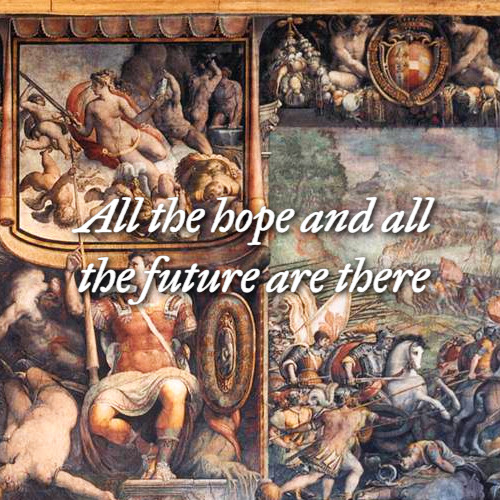
THE ROYAL BAPTISM AT THE PALAZZO FARNESE
Rome, 29 December 1869
I have just left the Farnese Palace, and I really believe that one can say without exaggeration: Naples is no longer in Naples; it is all in Rome today.
It is doubtful indeed that, even in the middle of his capital, Francis II would have seen himself surrounded by a crowd more numerous and better representing, not only the elite, but all the ranks of the nation of which he is the legitimate sovereign.
Certainly more magnificent pomp could have shone in Naples around the royal cradle. But first of all, could the young princess have hoped to have more august godparents before God and at her entry into the Christian life? The Holy Father, the first and greatest of the world's monarchs, the very Vicar of Our Lord Jesus Christ, and in whom the crown of suffering and misfortune heroically borne is added to the majesty of the tiara and the halo of sanctity; The Empress of Austria, who occupied the throne of the Habsburgs and whose sister was that great and pious Queen whom the people, anticipating in some way the judgment of the Church, like to proclaim "the Saint".
(...) The birth of the princess was a universal joy in the kingdom, and for two or three days hundreds of the most eminent people flocked to Rome. At the same time all the trains brought deputations chosen by each province and which the Piedmontese government allowed to pass, for want of being able to oppose a movement which was the expression of popular feeling.
From noon onwards, the vast halls of the Farnese Palace, which is one of the wonders of Rome and has few rivals in Europe, were filled with an enormous audience, composed almost exclusively of Neapolitans. Hardly the Senator of Rome and some Roman princes had been invited. The King, who, like all Bourbons, identifies his family with his country, had wished to be surrounded, with very few exceptions, only by his subjects and servants.
(...) With a delicacy worthy of his great heart, the King had asked the Bishops of the monarchy present in Rome to abstain from appearing at the ceremony: it was not necessary that a mark of religious fidelity should excite against the Episcopate of Naples the passions already so violent of Unitarianism and of the Revolution. On the other hand, fourteen Cardinals had come to pay homage to the majesty of right and wrong.
The number of young men mixed with the defenders who had been whitened in the service of the monarchy was particularly gratifying. After so long an exile, and in the midst of the temptations and seductions which are not spared, the presence and confidence of this generation, which is only just being born into public life, is a most favourable omen. Tradition is perpetuated, and hereditary devotion offers the Crown renewed phalanxes.
All the hope and all the future are there.
The Holy Father was represented by Cardinal Antonelli; the Empress Maria Anna, the godmother, was represented by Her Majesty the Empress [Elisabeth] of Austria, brilliant in beauty, grace, elegance and dignity. The procession of the princes was composed of H. M. the King of the Two Sicilies, H.R.H. the Duke and Duchess of Parma, H.I.H. and RR. the Grand Duke and Grand Duchess of Tuscany, H.R.H. the Count and Countess of Caserta, the Count and Countess of Girgenti, the Duke and Duchess of Alençon, the Duke of Bari and Princess Maria Immacolata, the Count and Countess of Trapani, the Prince their son and the two Princesses their daughters, the Prince of Hohenzollern.
The altar stood in the room decorated with the magnificent paintings of Salviati.
The young princess was carried on the arms of the Duchess of San Cesario. It was a touching honour for the illustrious and courageous Grand Mistress of the Palace, whose name is inseparably linked to that of the heroine of Gaeta and who deserved to receive the medal of that forever memorable siege; it was a touching honour for her to hold before the sacred font the royal child whose birth has just thrown a lightning bolt of happiness on the fortunes she has nobly shared.
S. Cardinal Patrizi performed the ceremonies and gave the young princess the names of Christina-Pia-Maria-Anna-Elisabetha-Natalina-Ephisa. The Neapolitan nurse in the magnificent costume of the women of her country, from the mountains of Avellino, was noted with interest near the font. These national clothes had a charm and a high significance in the midst of the brilliant finery of the great ladies and the insignia of the court figures.
The princess carried the magnificent christening gown, made of white lace, a gift from three hundred Neapolitan ladies, a masterpiece of taste and a guarantee of fidelity.
After the ceremony, the procession reformed. The Empress, the King, the Princes and Princesses went to the salons. The new Christian was brought to her august mother, whose emotion was deep. The Queen, with tears in her eyes, instructed the Duchess of San Cesario to thank all the faithful Neapolitans who had given, on this occasion, proof of a devotion that survives time, trials and persecutions. The Queen's emotion was so strong that duchess had to withdraw so as not to prolong its duration.
And, in fact, nothing honours a people and touches the hearts of sovereigns like these testimonies of a constancy above all perils, all perils and all sufferings.
The King was radiant with happiness. After ten years of proscription and in the midst of the joys of fatherhood, to find near him the servants who had been the companions of his misfortunes; to see a new generation rising up in the cult of right and duty; to receive the wishes of an entire people who aspire to become free again and to reconquer their nationality and their dynasty: what a consolation, and above all what hope!
Here, then, is at last a dawn of prosperity rising over the House of Bourbon and the kingdom of Naples! It is the harbinger of an even more beautiful day; it is the sign of a forthcoming triumph of good Law and Justice.
De Riancey, Henri (1870). Lettres sur Rome (Translation done by DeepL. Please keep in mind that in a machine translation a lot of nuance may/will be lost)
#this man was more optimist about the future of the bourbons than the bourbons themselves#the pictures are the salviati paintings in the palazzo farnese that de riancey mentions btw!#princess maria cristina of bourbon-two sicilies#queen marie sophie of the two sicilies#francesco ii of the two sicilies#empress elisabeth of austria#house of bourbon-two sicilies#on this day in history#long post
6 notes
·
View notes
Text

An engraving showing Francis I, Emperor of Austria, and his second wife, Maria Theresa of Naples and Sicily, walking with nine of their twelve children.
On the left of their parents are: Marie Caroline, Johann Nepomunk, Maria Clementina, and Ferdinand. To their right are Marie Louise, Franz Karl, Joseph Franz, Maria Leopoldina, and Marie Anne.
Missing are two daughters, Marie Caroline and Caroline Ludovika, who died in childhood. It's dated to 1807, which means Maria Teresa was pregnant with her 12th child at the time. She gave birth to a daughter, Amalie Theresa, on April 6th of that year. The baby only lived for three days, and she would die a few days after her daughter.
Two other children would also die young. Joseph Franz died aged 8, of what was likely an outbreak of yellow fever, two months after his mother. Johann Nepomuk died two years later, aged 3, of unknown causes.
#francis i#maria teresa of naples and sicily#marie louise of austria#Marie Caroline of Austria#Archduke Johann Nepomuk#Maria Clementina of Austria#ferdinand i#archduke franz karl#archduke joseph franz#Maria Leopoldina of Austria#Marie Anne of Austria#house of habsburg lorraine#austria#long live the queue
21 notes
·
View notes
Photo
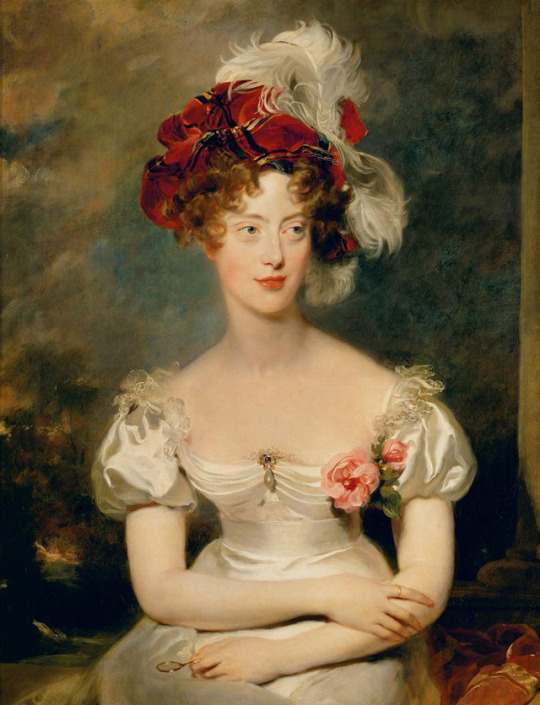
Maria Carolina of Naples and Sicily, Duchess of Berry (5 November 1798 - 17 April 1870)
#maria carolina of naples and sicily#maria carolina ferdinanda luisa#duchess of berry#daughter of francis i of the two sicilies#married charles ferdinand duke of berry#then ettore carlo lucchesi-palli#history#women in history#18th century#19th century#art
17 notes
·
View notes
Photo

The Late Ex-Queen of the French
Her Majesty Queen Marie Amelie, widow of Louis Philippe d'Orleans, King of the French, was the second daughter of Ferdinand I, King of the Two Sicilies, by his consort, Caroline, daughter of Francis, Emperor of Germany and of his consort, the Empress Maria Theresa, being the niece of Marie Antoinette, the murdered Queen of France; and great-aunt of the present Emperor of Austria., of the Queen of Spain, and of Francis II, ex-King of the Two Sicilies. Queen Marie Amelie was born April 26, 1782, and her marriage occurred thus: – Louis Philippe, Duke of Orleans, after various adventures and wanderings in different parts of the world came to reside, in 1800, at Twickenham in Middlesex. In 1808 the Duke accompanied to Malta, his invalid brother, the Count de Beaujolais, who died there; and after his death the Duke crossed to Messina, and was hospitably received by King Ferdinand at Palermo, his only capital – King Joachim Murat then ruling at Naples. The Duke of Orleans, during his visit gained the affection of the Princess Marie Amelie and married her, Nov 20, 1809. After the nuptials, they continued to reside at Palermo in quiet domesticity. They, at the Restoration of 1814 went to Paris, where the Duke's honors and estates were restored to him. His second son, Louis, Duke de Nemours, being born at Paris, Oct 25, 1814, was honoured by having as his sponsors Louis XVIII and the Duchesse d'Angouleme. On Napoleon's removal to Elba the Duke of Orleans was made a Lieutenant of France for the north by King Louis XVIII. He did not, however, hold the post long, and on reigning it came again to live at Twickenham. After Waterloo, and on the second Restoration he went to take his seat in the Chamber of Peers; but, his course of policy not being agreeable to the then Government, he once more retreated to Twickenham, and remained there till 1817, when he settled in France, not to live it till his high and adverse destinies were accomplished. Of his accession to the throne in 1830, of his abdication in 1848, and of his death, an exile at Claremont, Aug 25, 1850, it is needless to here give details: they are the events of a history universally known. Suffice it to say, that his devoted and admirable consort, Queen Marie Amelie, shared with grace his elevation, and never ceased to cling to him and to comfort him in his misfortunes and his exile. Reverenced in France, she acquired for herself and her family reverence in England. The protection and attention constantly shown to the Royal lady by the present Sovereign of Great Britain may remind us of the kindness of Louis the Great to the exiled James II and his Queen, though there there were political reasons, while here all was from the noblest and purest motives.
The London Illustrated News, 1866
3 notes
·
View notes
Photo

The Duke of Brunswick Dies There was another cause for anxiety: the Princess of Wales had announced that she was returning to England.
#caroline of brunswick queen of the united kingdom (princess of wales)#francis I king of the two sicilies#frederick william duke of brunswick#george IV (prince of wales and prince regent)#george keith elphinstone 1st viscount keith#maria isabella of spain queen of the two sicilies#mary duchess of gloucester#naples#princess charlotte of wales#prinny&039;s daughter: a biography of princess charlotte of wales#quatre bras#the delicate investigation#the hon.margaret mercer elphinstone#the napoleonic wars#thea holme
0 notes
Photo
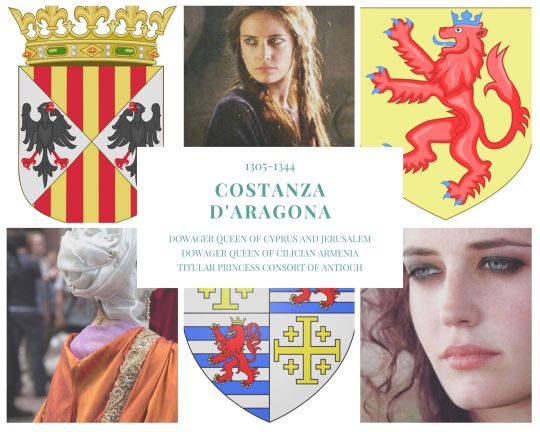
The day 4 October, day of the feast of St. Francis, Queen Costanza came to Famagusta. She was the daughter of King Federico of Sicily. She came with six galleys, who went to call Messer Bartholomio Montoliffo, bishop of Limassol, and two Friars Minor. This Queen Costanza came to Nicosia from Famagusta on 9 October, and she was married on Sunday the 16th of the same month in Nicosia, with great celebration and a court arranged for fifteen days. The day of the wedding she was anointed and crowned Queen, and she wore the crown with great honour.
Chroniques d’Amadi et de Strambaldi, t. 1, p. 398-9 [translation is mine]
Costanza was born in Sicily in 1305, the third child and first of the daughters of King Federico III of Sicily and his wife Eleonora of Naples.
At the tender age of one year old, she was betrothed to Prince Robert of France, youngest child of Philip IV of France and Queen Joana I of Navarre and Champagne. Robert, who was at that time 9, was a distant relation of his fiancée through her mother's side. Unfortunately, the following year the young Robert died, resulting in the annulment of the betrothal.
Ten years later, in 1317, the 12 years old Costanza was married to Henri of Lusignan, 34 years her senior, King of Cyprus and Jerusalem. Henri was the son of Hugues of Cyprus (Hugues III) and Jerusalem (Hugues I), and of Isabelle of Ibelin. Henri had succeeded his brother Jean, who had reigned for just one year (1284-85), before dying suddenly. Jean’s death was so sudden, some authors speculated he had been poisoned by his brothers.
Costanza had reached Cyprus at the beginning of October, and the ceremony was held in St. Sophia Cathedral in Nicosia, on October 16th. The same day she was anointed and crowned Queen consort of Cyprus and Jerusalem.
The Cypriot marriage only lasted 7 years since Henri died on the night between March 30th and 31st while he was away on a hunting trip. As the union had been childless, Henri was succeeded by his nephew Hugues IV.
As she didn't have any more reasons to stay in Cyprus, Costanza went back to Sicily, where (once again) she found herself involved in her father's matrimonial politics. In the meantime, in Cilician Armenia, King Leo IV, known for his pro-western tendencies, had decided to pursue his project to unify the Armenian and the Roman Churches. After ordering the murder of his wife Alice (who was moreover his stepsister as the daughter of his stepfather and former Regent, Oshin of Korikos), the now widower asked Federico III for his daughter Costanza's hand. Federico was too happy to oblige. Once again the Sicilian princess left her home to travel towards the east. She reached Cilicia and on December 29th, 1331, they got wed in Tarsus. Unfortunately for Leo, his rapprochement to a western and Roman Catholic power was heavily criticised by his subjects, resulting in his murder on August 28th, 1341, at the hands of his own barons. His marriage to Costanza proved fruitless, and his only child by Alice, Hethum, had died before 1331, so Leo was succeeded by his cousin Guy of Lusignan (who will adopt the name of Constantine).
The twice widowed Costanza again went back to Sicily, where her brother Pietro had in the meantime become King. Pietro died in 1342 and was succeeded by his 6 years old son, Ludovico (or Luigi), under the regency of his mother, Elisabetta, and his uncle, Giovanni. The following year, Costanza (almost 40 years old) was forced to marry a third and last time. Her third chosen husband was a 13 years old boy, Jean of Lusignan, Prince of Antioch and future Regent of Cyprus. Jean was son of Hugues IV and his wife Alix of Ibelin. Since he was related to Costanza's first husband (he was Henri's great-nephew.), they had needed a papal dispensation to marry. The marriage was celebrated on April 16th, 1343, but the union was short lived as Costanza died in Cyprus the following year (presumably on April 19th). Jean would remarry 6 years later with Alice of Ibelin, who would bear him his only child, Jacques.
Costanza fancasted as Eva Green
#women#history#history of women#historical women#sicily#costanza d'aragona (1305-1343)#aragonese-spanish sicily#federico iii#house of aragon and sicily#people of sicily#women of sicily#historyedit#myedit
23 notes
·
View notes
Text
WHY EVERY CATHOLIC NEEDS TO JOIN THE CONFRATERNITY OF THE HOLY ROSARY
.
During This Time Of Diabolical Disorientation And Mass Confusion Of The Faith, It Is More Important Now Than Any Other Time For Catholics To Put On The Full Armor Of God And Join The Confraternity. Satan Will Try To Stop You Don't Let Him.
.
The Immaculate alone has from God the promise of victory over Satan.
(Saint Maximilian Kolbe)
.
Mary was made Mother of God to obtain salvation for many who, on account of their wicked lives, could not be saved according to the rigor of Divine justice, but might be saved with the help of her sweet mercy and powerful intercession.
(St. John Chrysostom)
.
.
http://www.dominicansavrille.us/signup-form-for-the-rosary-confraternity/
.
BENEFITS OF JOINING THE CONFRATERNITY
.
1. The special protection of the Mother of God.
.
2. A share in the prayer of countless Millions of members the world over, and this even after death.
.
3. A share in the prayers, Masses and apostolic works of the entire Dominican Order.
.
4. The intercession of the entire Heavenly Court.
.
5. Various plenary and partial indulgences.
.
The Rosary Confraternity is a spiritual association, the members of which pray the entire rosary during the course of a week. They form a union of the faithful in heaven and one earth who, along with their own intentions, include the intentions and needs of all its members.
.
"If anyone has the happiness of being in the Confraternity of the Rosary, he has in all corners of the world brothers and sisters who pray for him." -St. John Vianney
..
"Whenever a person fulfills his obligation of reciting the Rosary according to the rule of the Confraternity, he includes in his intentions all its members, and they in turn render him the same service many times over." -Pope Leo XIII
.
Saint Louis de Montfort tells the story of a young girl of noble station named Alexandra, who had been miraculously converted and enrolled by St. Dominic in the Confraternity of the Rosary.
.
After her death, she appeared to him and said she had been condemned to seven hundred years in purgatory because of her own sins and those she had caused others to commit by her worldly ways. So she implored him to ease her pains by his prayers and to ask the Confraternity members to pray for the same end. St. Dominic did as she had asked.
.
Two weeks later she appeared to him, more radiant than the sun, having been quickly delivered from purgatory by the prayers of the Confraternity members. She also told St. Dominic that she had come on behalf of the souls in purgatory to beg him to go on preaching the Rosary and to ask their relations to offer their Rosaries for them, and that they would reward them abundantly when they entered into glory.
.
.
The Fifteen Promises of Mary Granted to those who Recite the Rosary Daily
.
The Blessed Virgin Mary Promised to Saint Dominic and to all who follow that "Whatever you ask in the Rosary will be granted." She left for all Christians Fifteen Promises to those who recite the Holy Rosary.
.
Imparted to Saint Dominic and Blessed Alan de la Roche
.
1. Whoever shall faithfully serve me by the recitation of the Rosary, shall receive signal graces.
.
2. I promise my special protection and the greatest graces to all those who shall recite the Rosary.
.
3. The Rosary shall be a powerful armor against hell, it will destroy vice, decrease sin, and defeat heresies.
.
4.The Rosary will cause virtue and good works to flourish; it will obtain for souls the abundant mercy of God; it will withdraw the hearts of men from the love of the world and its vanities, and will lift them to the desire for eternal things. Oh, that souls would sanctify themselves by this means.
.
5. The soul which recommends itself to me by the recitation of the Rosary, shall not perish.
.
6. Whoever shall recite the Rosary devoutly, applying himself to the consideration of its sacred mysteries shall never be conquered by misfortune. God will not chastise him in His justice, he shall not perish by an unprovided death; if he be just he shall remain in the grace of God, and become worthy of eternal life.
.
7. Whoever shall have a true devotion for the Rosary shall not die without the sacraments of the Church.
.
8. Those who are faithful to recite the Rosary shall have during their life and at their death the light of God and the plenititude of His graces; at the moment of death they shall participate in the merits of the saints in paradise.
.
9. I shall deliver from Purgatory those who have been devoted to the Rosary.
.
10. The faithful children of the Rosary shall merit a high degree of glory in Heaven.
.
11. You shall obtain all you ask of me by the recitation of the Rosary.
.
12. All those who propagate the Holy Rosary shall be aided by me in their necessities.
.
13. I have obtained from my Divine Son that all the advocates of the Rosary shall have for intercessors the entire celestial court during their life and at the hour of death.
.
14. All who recite the Rosary are my sons and daughters, and brothers and sisters of my only Son Jesus Christ.
.
15. Devotion of my Rosary is a great sign of predestination.
.
.
7 Reasons to Pray the Rosary, from the “Secret of the Rosary” by St. Louis de Montfort
.
Here are his 7 reasons:
.
1) It gradually gives us a perfect knowledge of Jesus Christ
.
2) It purifies our souls, washing away sin
.
3) It gives us victory over all our enemies
.
4) It makes it easy for us to practice virtue
.
5) It sets us on fire with love of Our Blessed Lord
.
6) It enriches us with graces and merits
.
7) It supplies us with what is needed to pay all our debts to God and to our fellow men, and finally, it obtains all kinds of graces for us from Almighty God
.
.
A GIRL IN MORTAL GIVES HER LAST CONFESSION TWO DAY'S AFTER HER DEATH
.
Father Eusebius Nierembergh relates, that there lived in the city of Aragona, Sicily, a girl named Alexandra. Being both noble and very beautiful, Alexandra was greatly loved by two young men. Driven by jealousy, these young men fought one day and killed each other. Their enraged relatives, in return, killed the poor young girl as the cause of so much trouble. They cut off her head and threw her remains into a well. A few days later, Saint Dominic of Guzman was passing through that place and inspired by Our Lord, approached the well and said: “Alexandra, come forth.” Immediately the head of the deceased came forth, perched on the edge of the well, and asked the saint to hear her confession. Perhaps accustomed to bizarre phenomena, Saint Dominic heard its confession and also gave it communion, in the presence of a great concourse of curious persons who had assembled to witness the miracle. Then the saint asked her to tell why she had received such a grace. Alexandra answered that when she was beheaded, she was in a state of mortal sin and would have been damned to hell. But on account of the rosary which she was in the habit of reciting, Most Holy Mary appeared and preserved her soul from unending torments.
So it happened that for two days the head of Alexandra retained life and when summoned was set upon the edge of the well, in the presence of all, and then the soul went to purgatory. Fifteen days later, Alexandra’s soul appeared to Saint Dominic, beautiful and radiant as a star. She then told him that one of the principal sources of relief to the souls in purgatory is the rosary which is recited for them; and that, as soon as they arrive in paradise, they pray for those who apply to them these powerful prayers. Having said this, Saint Dominic saw that happy soul ascending in triumph to the kingdom of the blessed.
(St. Alphonsus Liguori)
.
.
Don't let anyone tell you that praying the Rosary is "meaningless repetition" (when we don't pray it, we don't know it, anyway, and how could we?). If you ever feel the temptation to stop, because it feels "tedious," that's when you keep going, if only because love is not a feeling, but an act of the will. Take your time; praying it effectively and loving it is gradually learned. And the appetite does come with the meal. Turn "tedium" into persistence.
.
The Rosary is the ‘weapon’ for these times.” -Saint Padre Pio
.
“Give me an army saying the Rosary and I will conquer the world.” – Blessed Pope Pius IX
.
“The greatest method of praying is to pray the Rosary.” – Saint Francis de Sales
.
“Some people are so foolish that they think they can go through life without the help of the Blessed Mother. Love the Madonna and pray the rosary, for her Rosary is the weapon against the evils of the world today. All graces given by God pass through the Blessed Mother.” -St. Padre Pio
.
“Go to the Madonna. Love her! Always say the Rosary. Say it well. Say it as often as you can! Be souls of prayer. Never tire of praying, it is what is essential. Prayer shakes the Heart of God, it obtains necessary graces!” -St. Padre Pio
.
The holy Rosary is a powerful weapon. Use it with confidence and you’ll be amazed at the results.” -St. Josemaria Escriva
.
“Say the Holy Rosary. Blessed be that monotony of Hail Mary’s which purifies the monotony of your sins!” -St. Josemaria Escriva
.
“For those who use their intelligence and their study as a weapon, the Rosary is most effective. Because that apparently monotonous way of beseeching Our Lady as children do their Mother, can destroy every seed of vainglory and pride.” – St. Josemaria Escriva
.
“You always leave the Rosary for later, and you end up not saying it at all because you are sleepy. If there is no other time, say it in the street without letting anybody notice it. It will, moreover, help you to have presence of God.” – St. Josemaria Escriva
.
“The Rosary is a powerful weapon to put the demons to flight and to keep oneself from sin…If you desire peace in your hearts, in your homes, and in your country, assemble each evening to recite the Rosary. Let not even one day pass without saying it, no matter how burdened you may be with many cares and labors.” – Pope Pius XI
.
“The rosary is the book of the blind, where souls see and there enact the greatest drama of love the world has ever known; it is the book of the simple, which initiates them into mysteries and knowledge more satisfying than the education of other men; it is the book of the aged, whose eyes close upon the shadow of this world, and open on the substance of the next. The power of the rosary is beyond description.” – Archbishop Fulton Sheen
.
““The Rosary is the most excellent form of prayer and the most efficacious means of attaining eternal life. It is the remedy for all our evils, the root of all our blessings. There is no more excellent way of praying.” Pope Leo XIII
.
“No one can live continually in sin and continue to say the Rosary: either they will give up sin or they will give up the Rosary” – Bishop Hugh Doyle
.
“The Most Holy Virgin in these last times in which we live has given a new efficacy to the recitation of the Rosary to such an extent that there is no problem, no matter how difficult it is, whether temporal or above all spiritual, in the personal life of each one of us, of our families…that cannot be solved by the Rosary. There is no problem, I tell you, no matter how difficult it is, that we cannot resolve by the prayer of the Holy Rosary.” -Sister Lucia dos Santos of Fatima
.
“The Rosary is a long chain that links heaven and earth. One end of it is in our hands and the other end is in the hands of the Holy Virgin…The Rosary prayer rises like incense to the feet of the Almighty. Mary responds at once like a beneficial dew, bringing new life to human hearts.”
St. Therese of Lisieux
.
“When people love and recite the Rosary they find it makes them better.” -St. Anthony Mary Claret
.
The Rosary is the most beautiful and the most rich in graces of all prayers; it is the prayer that touches most the Heart of the Mother of God…and if you wish peace to reign in your homes, recite the family Rosary.~Pope Saint Pius X
.
When you say your Rosary, the angels rejoice, the Blessed Trinity delights in it, my Son finds joy in it too, and I myself am happier than you can possibly guess. After the Holy Sacrifice of the Mass, there is nothing in the Church that I love as much as the Rosary.~Our Lady to Blessed Alan de la Roche
.
One day, through the Rosary and the Scapular, Our Lady will save the world.~Saint Dominic
.
Even if you are on the brink of damnation, even if you have one foot in hell, even if you have sold your soul to the devil as sorcerers do who practice black magic, and even if you are a heretic as obstinate as a devil, sooner or later you will be converted and will amend your life and will save your soul,IF YOU SAY THE HOLY ROSARY devoutly every day until death for the purpose of knowing the truth and obtaining contrition and pardon for your sins-Saint Louis de Montfort
.
“When you say your Rosary, the angels rejoice, the Blessed Trinity delights in it, my Son finds joy in it too, and I myself am happier than you can possibly guess. After the Holy Sacrifice of the Mass, there is nothing in the Church that I love as much as the Rosary.” - Our Lady to Blessed Alan de la Roche
.
Even if You Pray the Rosary for Years and See No Improvement Spiritually, Do Not Give Up. Mary and Jesus Will Always Come to Your Aide.
.
Imprimatur: Patrick J. Hayes, D.D. Archbishop of New YorkWhy All Catholic's Need To Join the Confraternity of the Rosary Immediately
.

#the rosary#rosary#salvation#catholicism#heaven#catholic prayers#traditional catholic#catholic#catholic faith#mary mother of jesus#mary mother of god#christian faith#christian prayer#christianity#jesus loves you#true love#love#daily devotion#devotional#catholic church#catholic rosary#jesus christ#jesus
2 notes
·
View notes
Text








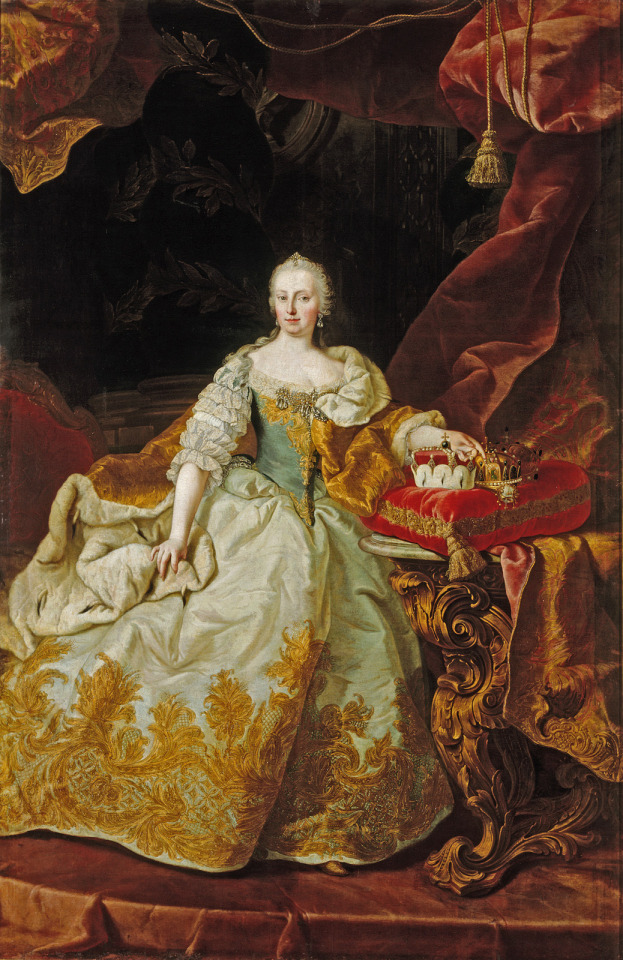

Maria Theresa (1717-1780).
Ruler of the Habsburg dominions and the last of the House of Habsburg.
.
She was the only female ruler of the Habsburg dominions and the last of the House of Habsburg. She was the sovereign of Austria, Hungary, Croatia, Bohemia, Transylvania, Mantua, Milan, Lodomeria and Galicia, the Austrian Netherlands, and Parma. By marriage, she was Duchess of Lorraine, Grand Duchess of Tuscany and Holy Roman Empress.
.
She started her 40-year reign when her father, Emperor Charles VI, died in October 1740. Charles VI paved the way for her accession with the Pragmatic Sanction of 1713 and spent his entire reign securing it. He neglected the advice of Prince Eugene of Savoy, who averred that a strong military and a rich treasury were more important than mere signatures. Eventually, he left behind a weakened and impoverished state, particularly due to the War of the Polish Succession and the Russo-Turkish War (1735–1739). Moreover, upon his death, Saxony, Prussia, Bavaria, and France all repudiated the sanction they had recognised during his lifetime. Frederick II of Prussia (who became Maria Theresa's greatest rival for most of her reign) promptly invaded and took the affluent Habsburg province of Silesia in the seven-year conflict known as the War of the Austrian Succession. In defiance of the grave situation, she managed to secure the vital support of the Hungarians for the war effort. Over the course of the war, despite the loss of Silesia and a few minor territories in Italy, Maria Theresa successfully defended her rule over most of the Habsburg empire. Maria Theresa later unsuccessfully tried to reconquer Silesia during the Seven Years' War.
.
Maria Theresa and her husband, Francis I, Holy Roman Emperor, had eleven daughters, including the Queen of France, the Queen of Naples and Sicily, the Duchess of Parma, and five sons, including two Holy Roman Emperors, Joseph II and Leopold II. Of the sixteen children, ten survived to adulthood. Though she was expected to cede power to Francis and Joseph, both of whom were officially her co-rulers in Austria and Bohemia, Maria Theresa was the absolute sovereign who ruled with the counsel of her advisers.
.
Maria Theresa promulgated institutional, financial and educational reforms, with the assistance of Wenzel Anton of Kaunitz-Rietberg, Friedrich Wilhelm von Haugwitz and Gerard van Swieten. She also promoted commerce and the development of agriculture, and reorganised Austria's ramshackle military, all of which strengthened Austria's international standing. However, she despised the Jews and the Protestants, and on certain occasions she ordered their expulsion to remote parts of the realm. She also advocated for the state church and refused to allow religious pluralism. Consequently, her regime was criticized as intolerant by some contemporaries.
.
It is unlikely that Maria Theresa ever completely recovered from the smallpox attack in 1767. She suffered from shortness of breath, fatigue, cough, distress, necrophobia and insomnia. She later developed edema.
[Submission]
#maria theresa#Maria Theresa of Austria#Empress Maria Theresa#Empress#austrian history#austria#18th century#historical#historic#história#histoire#history#history lesson#history buff#history crush#history hottie#history nerd#history lover#history geek#historical crush#historical babes#historical hottie#historical figure
106 notes
·
View notes
Photo
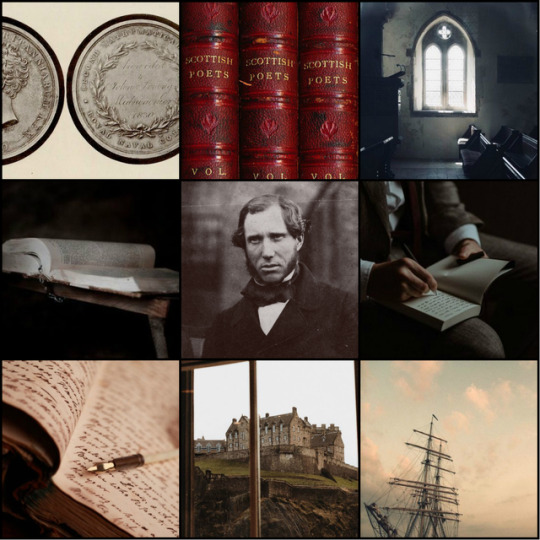
J O H N I R V I N G
(February 8th, 1815 - ??)
“So let us consider that all sorrows are meant by God to give us a distaste to this life, and a greater desire to be removed to that world where there will be no more tears or sorrows, no more partings of dear brothers and friends, but where all will be eternal, fixed, and everlasting.”
John Irving was born on February 18th, 1815, at his family home at No. 106 Princes Street in the New Town area of Edinburgh. His father, also named John, was a Writer to the Signet and a close childhood friend of famous Scottish author, Sir Walter Scott. His mother, Agnes Clerk Hay, was the eldest daughter of Colonel Lewis Hay and could claim ancestry from two well-established Scottish clans. Born to a wealthy and respected family, John—a middle child of six surviving siblings—had a life of great opportunity, but also many personal sorrows and tragedies.
Agnes Irving died at Port Seton in the summer of 1823, when John was eight years old. Growing up in her absence, later biographer Benjamin Bell recalled her as a “very excellent, godly woman” and considered her impact on her son as “doubtless”.
After his mother’s death, John became involved in his studies at the New Academy of Edinburgh, a school established by founders such as Sir Walter Scott with a focus on Classical learning, languages, natural sciences, writing, and arithmetic. The latter three categories were topics at which John would come to excel. Fellow students would recall the young Irving as, “a nice fellow, fond of play, with a good deal of quiet humour, courageous, but very slow to quarrel or take offense”. He concluded his studies before the seven-year term, and instead enrolled at the Royal Naval College in London, thereby beginning his career in the Royal Navy.
Despite a setback of a case of scarlet fever, John excelled at his studies to the extent of winning a silver medal in a mathematics competition during the Midsummer term of 1830. He would keep this medal with him as a personal token for the rest of his life. He went on to join the HMS Cordelia and HMS Fly as part of his Naval education, but it was on the HMS Belvidera where he would come into his own and form several lasting relationships.
On the Belvidera, he met fellow midshipmen William Elphinstone Malcolm (affectionately nicknamed “Elphie” by Irving) and George Kingston. Avid in their Christian faith, the three boys became particularly close. Despite a marked attitude on Irving’s part that was later recalled as a “hot temper and a rather domineering manner”, John kept these friends close for most of his life, and would keep close correspondence long after their group disbanded. He attempted to replicate this sort of group upon joining the HMS Edinburgh in 1833. However, this same faith earned his new group the disparaging nickname of the “Holy Ghost boys”, which Irving commented to William Malcolm in a letter as “horrid to relate”. Despite his difficulty socializing, Irving did document some of his adventures on the Edinburgh, such as climbing Mount Etna in Sicily (the weather conditions of which would scar his upper lip with frostbite).
However, another noted change in personality began to emerge, particularly in conjunction with the loss of his sister-in-law, Isabella, in childbirth. The tone of Irving’s letters began to show a streak of melancholy and a disillusionment with the Royal Navy. He would remark to Malcolm of his loss of interest in things of enjoyment, a detachment from his faith which alarmed him, and a disdain for Navy life. In one particularly scathing letter, he exclaimed, “I am so sick of this ship and everything belonging to it,” before reminiscing about better times on the Belvidera. Another letter saw him referring to himself as “miserable” and “wretched”, and claimed that the only thing he had hope in was the Gospel.
His fortunes, in his opinion, were about to change. In 1837, Irving resigned from the Navy in order to pursue sheep-farming in Australia, accompanied by his youngest brother, David. They were given several thousand pounds by their father and the opportunity to purchase land in New South Wales. At first optimistic about this venture, John soon began to realize that his experiences were not to go as expected. Falling wool prices, severe weather, crime, and illness plagued him, to the point that he was afflicted with a near-fatal case of dysentery that left him bedridden for five weeks. Then, in 1841, John received word that his oldest brother, George, had suddenly died of meningitis. Undoubtedly, this was another weight on an already heavy heart.
By 1843, the faltering economy had drained John of nearly all of his finances, nearly leaving him in debt. Upon recommendation from his father, John left his remaining herds and house to David and rejoined the Royal Navy, boarding onto the HMS Favourite in Sydney and returning home to Scotland.
John arrived home in the midst of an event known as The Disruption, a dramatic schism in the Church of Scotland. Baffled by what he called a “mystery”, especially with his older brother Lewis’ involvement, John characteristically commented to Malcolm that “the Gospel seems in no way concerned in the dispute”. Shortly after, he signed onto the HMS Volage and was immediately promoted to Lieutenant.
His time on the Volage was spent in a patrol of the Irish coast in the midst of a revolt advocating for Irish home rule. Irving made several observations of Irish life and politics while also displaying a change in tone towards his Navy career. By 1843, he was now in belief that he could begin on the path towards a Commandership or a Captaincy, and began looking for opportunities to advance. Near the end of the patrol, he had begun to hear rumors about an Arctic exploration attempt. Quickly gathering recommendations from past captains, he applied for the then-unnamed expedition. He spent a short time on the HMS Excellent in the waiting interim.
Upon being accepted onto the HMS Terror, Irving kept a close correspondence with his sister-in-law, Kate Irving. He included sketches of the modified locomotive engine on Terror as well as observations of personnel and ship life. Again, a tone shift became apparent as he seemed to be excited and optimistic about the Expedition and its members. In particular, he appeared to be most pleased with Captain Francis Crozier, remarking, “I like my skipper very well”. It was evident that he was pleased enough with his situation to make lighthearted jokes at the expense of Sir John Franklin, commenting to Kate that their victualing was so good on Terror that, “you need not think we have been eating our shoes”, in reference to Franklin’s famous nickname of ‘the man who ate his own boots’. Irving concluded his correspondence with a farewell letter, believing it would be some time before he would be able to write to Kate again. He expressed his belief that the Passage would be achieved, sent another sketch of Erebus and Terror anchored in a bay in Greenland, and a small sample of Tripe de Roche lichen. This was the last letter received from him.
Irving was mentioned once on the Victory Point Note later found by searchers, in the second note written on April 25th, 1848, with, “This paper was found by Lt. Irving under the cairn supposed to have been built by Sir James Ross in 1831.”
It wasn’t until the summer of 1879 that any further clues were found to John Irving’s fate. An expeditionary group led by Lieutenant Frederick Schwatka and a group of Inuit discovered an above-ground grave that had been picked apart by animals, but held a relatively intact skeleton. Schwatka and Austrian adventurer Heinrich Klutschak uncovered several pieces of canvas that served as the skeleton’s shroud, as well as pieces of blue fabric denoting a Naval officer’s coat, a section of a folded silk handkerchief, a spyglass, and—most notably—a silver medal laying on a flat rock outside of the grave. Further inspection revealed the medal’s owner—John Irving.
Schwatka decided to repatriate the remains back to Edinburgh. At the time, the remains were the only ones to be returned, owing to Schwatka’s belief that the skeleton had been properly identified. Word was sent to John’s older brother, Alexander, as well as his sister, Mary Scott-Moncrieff. Irving’s remaining family arrived in Edinburgh and held a funeral on January 7th, 1881. The funeral and public procession to Dean Cemetery was well-attended, with Irving’s coffin draped with a Union Jack and topped with a Lieutenant’s hat and saber. A gun salute was fired as pallbearers, all sailors, took him to his final resting place. A grave marker bore an impression of the silver mathematics medal that identified him, as well as an etching of his imagined funeral, an epitaph recalling his fate, and a set of stones recalling his grave on King William Island. The final remark came from the Book of Romans, Chapter 8, Verse 35: “ Who shall separate us from the love of Christ shall tribulation or distress - or famine".
In modern times, the identity of the skeleton buried in Edinburgh would be called into question, and indeed remains a mystery. However, there is no doubt that some part of John Irving was buried on that day in 1881, whether it was his body or his memory. To his family, at least, he found some semblance of peace and was given the rare opportunity to come home.
#franklin expedition#amc the terror#terror blogging#john irving#irving sunday#I'VE BEEN WAITING TO POST THIS ALL WEEK#NOW I'M GONNA GO PASS OUT
371 notes
·
View notes
Photo

Melissa Nóbrega and Bruna Griphao as the younger and the adult version of Leopoldina of Brazil, Princess of Brazil, Princess of Saxe-Coburg and Gotha and Duchess of Saxony in “Nos Tempos do Imperador” (2020), a sequel to “Novo Mundo” (2017).
Princess Leopoldina of Brazil (13 July 1847 - 7 February 1871) was the second daughter of the Emperor Dom Pedro II of Brazil — who ruled the Empire of Brazil (1822 - 1889) for almost half a century — and Empress Consort Teresa Cristina of the Two Sicilies. Her paternal grandparents were the Emperor Dom Pedro I of Brazil and Empress Consort Maria Leopoldina of Austria, and her maternal grandparents were King Francis I of the Two Sicilies and Queen Consort Maria Isabella of Spain. Leopoldina was the third of four siblings, but only she and her older sister Princess Isabel of Brazil survived infancy. The Princess married Prince Ludwig August of Saxe-Coburg and Gotha, known as Prince Dom Luís Augusto in Brazil, son of Prince August of Saxe-Coburg and Gotha and Princess Clémentine of Orléans, thus she was a member of House of Braganza by birth and a member of House Saxe-Coburg and Gotha-Koháry by marriage. Leopoldina and Ludwig had four sons: Prince Dom Pedro Augusto/Peter August, Prince Dom Augusto Leopoldo/August Leopold, Prince Dom José Fernando/Joseph Ferdinand and Prince Dom Luís Gastão/Ludwig Gaston. The Princess was the second in the line of succession to the imperial throne of Brazil due to the difficulties of her older sister in producing heirs. After Leopoldina’s death her two eldest sons were the 2nd and 3rd in the line of succession to the Brazilian throne until Isabel had her first son. This made Leopoldina, involuntarily, the founder of the Saxe-Coburg and Braganza branch of the Imperial House of Brazil. Princess Leopoldina died of typhoid fever in Vienna at only 23 years old.
#nos tempos do imperador#perioddramaedit#leopoldina of brazil#princess leopoldina#leopoldina do brasil#princesa leopoldina#period drama#mine#mine: edit#mine: nos tempos do imperador#mine: princesa leopoldina#mine: novela#mine: brazilian tv#mine: brasil#novela#brazilian novela#brazilian tv#brazilian stuff#novela brasileira#princesa leopoldina (ntdi)#dona leopoldina#leopoldina de bragança#ce: 19th century#de: 1850s#de: 1860s#bruna griphao#melissa nóbrega
39 notes
·
View notes
Text
Calendar of State Papers Foreign: Edward VI 1547-1553
1551
June 6.
Florence. Francis Peyto to the Earl of Warwick. With his last of the 23d May, had sent to his Lordship the plot of Dragut's escape, and divers occurrents of these parts. Since then nothing is heard but the daily increasement of Parma's matters. Don Ferrante Gonzaga is ordered to Castello Guelfo, eight miles from the city, there to attend and waste the country.
The Pope wages many soldiers and commands them all to Bologna. The Duke here gave licence for 3,000 of his subjects, who have already departed, and it is said he will forthwith despatch 2,000 foot and 200 horse under the conduct of Signor Radulpho Baglione, one of his chiefest captains.
No man passes through his dominions unsearched of letters and whither he repairs. He is a Prince who wisely governs himself in all occasions. Good store of ammunition is sent to Bologna. Hard shift has been made of the Pope to have money; besides good surety, he gives two per cent., and so he takes one half-year at this interest; nevertheless he should be but simple furnished, were not the Emperor more his aid.
Yesterday arrived some Frenchmen from Rome, who say that M. de Thermes looks for his licence daily, and goes to Parma, and Cardinal Tournon to Venice. The French in Rome are but homely welcome. Dondego [Don Diego], the Emperor's Ambassador, singularly serves his master with the Pope. M. de Monluc, who is sent to the Pope from the French King, passed this way two days ago.
The Spanish Prince is daily expected in Italy, and to embark at Lerizzi [Lerice], not trusting to come to Genoa for the business that has been lately in these parts. A plot to give the town into the Emperor's hands had been discovered there, and Spinola, one of the chief actors therein, taken and imprisoned. It is reported that Dragut has taken two galleys off Sicily, and that for fear of the Turk's navy many soldiers are sent to the river of Apulia. Sends herewith the news from Rome, whereby his Lordship will see whether they be truly advertised.
If Stafford comes this way his Lordship shall have knowledge. Returns thanks for his reward, the receipt of which he had acknowledged in his last letter. [One page and a half.] Annexed,
370. I. "From Rome of the 23d of May." Latest news from Flanders bear that betwixt the noblemen of the realm (of England) is like to be great sedition, especially in the north, by reason of changes among the wardens; that the Marquis of Dorset with a great company is sent thitherward, and to be immediately followed by the Earl of Warwick with all his power.
The Earl of Shrewsbury is put out of his office; and the Earl of Derby commanded to renounce his title of the Isle of Man to the King, which he has plainly denied, and prepares himself. All men out of wages are taken up, but whereunto it is not known. 500 or 600 men waited on the Mayor and Aldermen of London, complaining of the late influx of strangers, and that by reason of the great dearth theg cannot live for these strangers, whom they were determined to kill up through the realm, if they found no remedy.
To pacify them the Mayor and Aldermen caused an esteame to be made of all strangers in London, which showed an amount of 40,000, besides women and children, for the most part heretics fled out of other countries. Details of precautionary and restrictive orders issued by the municipal authorities accordingly.
The war proceeds against Ireland. The Scots molest England on the north. A ship laden by the English at Antwerp with harness, weapons, and much gold, had been arrested for the Emperor: they are likely to lose all and many of their men be imprisoned. They play bankrupt many of them in Flanders.
There is chopping and changing of them of the Council. The gentry are obliged to fortify themselves in their houses, except those who are obliged to go to the wars, and the common people die for hunger. The Emperor has sent to the King and Council that he would have his nephew (sic) Lady Mary to marry with the King of Polonia, whose wife died lately: the answer thereto not yet known.
The French take their time, but as yet they keep peace with them. There be of their knot Lord Shrewsbury, Lord Dacre, the Constables, Mr. Bowes, knight, and all their retinue, and the Earl of Derby. The end of this heavy tragedy of that realm, with the ruin of the King, will be shortly seen, as it was never other like with this Government.
Morysine has left the Emperor's Court with great rebuke and shame, and is replaced by Dr. Wotton. As they fear sore the Emperor in this travail within the realm, it is thought they will consent to the sending of the Lady Mary. The fourth of September shall be the first sitting of the Council.
370. II. "In letters of the 29th of May." News concerning Parma are clean contrary to what he formerly wrote. The Pope and French King are at utter defiance. Don Ferrante Gonzaga has already wasted Campania with 800 horse and 6,000 foot.
The Emperor has lent the Pope 3,000,000 crowns, and says he shall lack neither men nor money to defend the Church. The Pope is marvellously offended with the message brought by his nephew Sig. Ascanio della Cornia from the French King, that he swears he will lay his triple crown with all the rest to pledge, but he will have Parma.
Imminent danger of great wars. The Emperor and his son the King of Spain reported to be very sick. News from France of the embassy for marriage of the King of England with the French King's daughter, and of the exchange of the Orders of the Garter and St. Michael. If the marriage goes forward, it is thought the Pope will excommunicate both. Two days ago here was taken and put in prison Sig. Aurelio Fregoso, a Genoese, a great captain of the French party, who came privily from Duke Octavio.
Note on back: "Mr. Thomas Stafford, my Lord's nephew, will pass by you shortly, and perchance move you for a certain Partito, wherein take heed what you do, nor in nowise disclose to him of the matter I wrote you of the hospital. And as for all other things you may talk at large, he hath good fancy towards you." [Three pages.]
----
June 6.
Angers. Sir John Masone to the Council. In consequence of the receipt of their letter of the 25th May, he had a conference with the Constable relative to the conduct of Senarpont at Sandingfeld, and was assured by him that the King had so written his mind to the former that they should hear no more of it, and that the ground had not been given to Senarpont, or was by any means so meant. M. de Chastillon moreover was shortly to go to these frontiers, and if he found anything there out of square, should have commission to see a full redress therein.
This evening M. de Chastillon came to him on part of the King to notify the election of King Edward into the Order of St. Michael on the preceding day, and that M. de St. André was to repair forthwith to England for the purpose of investing his Majesty. Chastillon goes to Picardy shortly.
The affair of Parma still hangs upon the answer looked for from the Bishop of Rome; but it is thought the end thereof shall not be so unquiet as it was feared. The Scottish Queen makes as though she would gladly be in Scotland, but he believes she will make no such haste, being desirous of bringing all the forts in Scotland into the hands of the French, which as yet has not been obtained, and were the Scottish noblemen at home again, she knows there would be no possibility in the matter.
The Scot that should have poisoned the (young) Scottish Queen arrived here yesterday. The King left for Chateaubriand to-day. About Thursday or Friday next the Marquis of Northampton will be at Nantes, and if no alteration is made in the plan will come from thence to Chateaubriand. By this time he is probably within a day's journey from Orleans. [Four pages. Indorsed by Cecil.]
----
June 8.
Orleans. The Marquis of Northampton to Sir John Masone. Thanks him for his letters of the 4th and 6th inst., and proposes that instead of Masone going to Nantes, they shall meet at his last loading between this and Nantes, called Engrand, where he intends to be on Sunday or Monday night at farthest, considering that coming down the water they shall be in more quiet and have better time for conference. Refers to the discretion of Masone his reply to the Constable's wish for Marshal St. André's tarrying, but he should be reminded of the mutual understanding that there was to be no delays in the reciprocal departure of the Ambassadors. Sends list of those who compose the embassy with the number of their servants, as follows:—
Marquis of Northampton, with 62 servants.
The Bishop of Ely " 21 "
Sir Philip Hoby " 30 "
Sir William Pickering " 30 "
Sir Thomas Smith " 7 "
Dr. Oliver " 4 "
William Thomas, Secretary " 2 "
The Earl of Worcester " 8 "
The Earl of Rutland " 9 "
The Earl of Ormond " 3 "
Lord Fitzwalter " 4 "
Lord Lisle " 8 "
Lord Abergavenny " 7 "
Lord Braye " 3 "
Lord Rivers " 4 "
Mr. Throgmorton " 4 "
Mr. Sydney " 4 "
Sir William Cobham " 2 "
Sir Joseph Cutts " 2 "
Sir John Perrott " 4 "
Sir Anthony Guidotti " 3 "
Sir Gilbert Dethick, Garter King of Arms " 4 "
Mr. Fitzwilliams " 3 "
Mr. Cary " 4 "
Mr. Knolles " 1 "
Mr. Edmund Vernay " 2 "
Mr. Francis Vernay " 2 "
Mr. Young " 4 "
Mr. Nicholas Alexander " 2 "
Chester Herald at Arms, [William Flower] " 2 "
Rouge Dragon poursuivant [Martin Maroffe] " 1 "
Lucas Fringer " 1 "
[Two pages and a half. Copy in Sir J. Masone's Letter-Book.]
---
June 16. The Council to the Marquis of Northampton. Had received his letter of the 6th. On Sunday last the French Ambassador notified to his Majesty his election into the Order of St. Michael, and yesterday requested audience again that he might receive an official acceptation thereof in order to certify the King his master of the same; wherein, as they can conjecture, he is a very precise and circumspect man, intending to write even the same words that he should receive. Desire him to explain to the French King the high gratification of their master, which was perhaps not so apparent to the Ambassador. "The King's Majesty's young nature being of such modesty that in his most gladness hath not much outward show thereof, and besides that his Majesty's French speech being not natural to him, cannot so abundantly express the joy of his heart as if he should have answered in his natural speech as the French King did in his." Are informed that the English Commissioners and the Scots have agreed upon a treaty, the particulars of which in writing they expect to receive by Sir Thomas Chaloner in four days, and request him to notify this to the French King. [Three pages. Draft.]
---
June 26.
Chateaubriand. The Marquis of Northampton and the other Ambassadors to the Council. On Wednesday last, after dinner, they had another conference with the French Commissioners respecting the amount of dowry to be settled on the Princess Elizabeth in the event of her marriage with his Majesty, the particulars of which are minutely detailed. After long discussion they reduced their original demand of 1,500,000 crowns to 800,000; and the French raised their offer of 100,000 to 200,000 crowns.
Desire to have farther instructions, and that they may be sent speedily by the bearer, William Thomas, as the King leaves for Nantes on Monday next, minding to tarry on the way, and there not above eight or ten days, intending to conduct the Queen where she shall be brought to bed. Such removings greatly add to their charges, and they have already troubled the country so much with the furniture of their numerous horses, that if they have to wait till the King's removing from Nantes, they believe it shall not be possible for them to be supplied, the train of the Court being so great as it is.
"Garter's reward was a chain weighing 200 crowns and somewhat more, and the gown which the King wore that morning, which was of damask, set with agletts esteemed between 20 and 30 pounds." Have received the reply of the French Commissioners in writing, and send it herewith. [Six pages.]
----
(....)
Mr. Nicholas Wotton, Ambassador with the Emperor at Augsburg, had audience of him, and having declared his instructions unto the Emperor, his answers were:—
"1. That my Lady Mary's matter concerning mass was of importance, and therefore he said he would think of it and speak with D'Arras, of whom he should know his answer in it.
"2. That as for the request for the King's Highness' Ambassador to have the communion secretly, &c., he knowing in his conscience that the communion, used as it is in England, is not good, but contrary to the order used by all the Church so many hundred years, he should offend God if he permitted it, and that therefore he may not and would not do it.
"3. That as for the arrests made in the Low Countries, the Emperor made strong at it, and said he knew nothing of it. 'Marry,' quoth he, 'the French at Dieppe had staid some of my subjects' ships, whereupon the French ships were staid again in the Low Countries; and unless there were some of the English merchantmen's goods in their ships, he knew not what it should mean.' He could say no more to it at this time, but he said he would write to the Queen his sister of it, who shall certify and satisfy the English Ambassador there in this point.
"4. That the Emperor did remit Mr. Wotton for an answer for the licence for the powder to Mons. D'Arras, whereupon he was earnest with Mons. D'Arras for it. His excuses were, that the King of England had no need at that time of it; that the Emperor had need of it, and should lack for himself, for now the Turk hath opened the war again."
----
June 30.
[Greenwich.] King Edward VI. to Sir John Masone, recalling him from his embassy in France. [One page. Draft.]
----
June 30.
[Greenwich.] Same to Sir William Pickering, intimating his appointment as resident Ambassador in France. [One page. Draft.]
---
June 30.
[Greenwich.] Instructions from King Edward VI. to Sir William Pickering, to be observed by him on entering upon his duties as Ambassador after the departure of Sir John Masone. [Five pages. Indorsed by Cecil. Draft.]
----
June 30.
Greenwich. Second instructions given by the King and Council to the Marquis of Northampton and his colleagues. They may accept of 600,000 crowns, but no less; shall agree to no relinquishment of his Majesty's titles, rights, or claims to anything in France or Scotland; shall decline any offensive and defensive war treaty; and shall listen to no alterations of religion in England, that "perchance may be moved by the practices of the Romans and their adherents." [Two pages. Copy in Sir J. Masone's Letter-Book.]
----
July 2.
Greenwich. Third instructions from King Edward VI. and the Council to the Marquis of Northampton and his colleagues. They shall ask 400,000 crowns, and may agree to take 200,000, with the transportation at charges of the French King, rather than break off the treaty. [Six pages. Draft.]
---
July 3.
Brussels. Sir Thomas Chamberlain to the Council. Details a conversation which he had this evening with the French Ambassador in relation to the ceremony used by the Marquis of Northampton in investing the French King with the Order of the Garter, and the treaty of marriage between King Edward and the Princess Elizabeth, god-child of his father King Henry VIII., now only seven years of age, which is concluded, and the Marquis on the eve of returning.
The Emperor is not expected here for two months, although one of the Council a few days since said that he was to leave Augsburg for this place on the 10th inst. It is reported that the Turk does nothing as yet in Transylvania, and that the inhabitants of that country are treating upon articles to be wholly at the devotion of the King of the Romans.
The Prince of Spain has not yet embarked, and it is now said he will take shipping at Spezzia, beside Leghorn, under the Duke of Florence, for that at Genoa they have but little mind at this time to him and his train. The States of Brabant are here assembled. The Duke of Arschot has been slain by one of his own gentlemen through folly. The Prince of Orange now marries the daughter of Count Buren. Hears that four or five ships of war have left Zealand, said to be for the conducting of the herring fleet. Still great military preparations are being made. [Four pages. Partly in cipher, deciphered.]
----
July 17.
Nantes. The Marquis of Northampton to Cecil. The inclosed packet is from a Scot in the French Court, who seems to bear good will to the English, and has written to some of his friends to apprize the Marquis from time to time of what happens in Scotland. Requests Cecil to read them, and if he thinks good to forward them to Berwick for delivery. [Half a page.]
-----
July 19.
Angers. Treaty of marriage between King Edward VI. and Elizabeth, daughter of Henry II., King of France.
---
July 20.
Beaufort. Henry II., King of France, to King Edward VI. Recredentials of the Marquis of Northampton and his colleagues, and expressive of his Majesty's satisfaction at the conclusion of the treaty. [Countersigned by De l'Aubespine. Broadside. French.]
----
July 20.
Beaufort. Same to same. Re-credentials of Sir John Masone, approving of his conduct while Ambassador, and expressive of his Majesty's pleasure at the appointment of Sir William Pickering as successor. [Countersigned by De l'Aubespine. Broadside. French.]
----
July 20. Inventory of silver and gilt plate delivered to Sir William Pickering on entering upon his duties as Ambassador-Resident in France, amounting to 2,697 ounces. [Two pages.]
---
Aug. 29. John Dominic Panizonus, the Emperor's Secretary, to King Edward VI. Informing his Majesty of the death of William Panizonus, and requesting that his sons Constantine and Christopher, whom on his death-bed he had recommended to his Majesty, may be taken into his service. Two of the same family,—Francis, a physician, and John Baptist, a valet (domicellus),—had previously died while serving the Crown of England. [Latin. One page.]
---
Aug. 30.
Fontainebleau. Sir Anthony Guidotti to the Earl of Warwick. Last Wednesday the 26th inst., in a private interview, the Duke of Guise suggested that, during the trouble between the French and the Emperor, England should arm by sea for the defence of her coast; whereby the Emperor might be put in some doubt, and yet could have no occasion to be offended. And thus England keeping one side, and the French having a strength on the other, the Emperor would not be too hasty to adventure into the canal between both. If he may offer an opinion, it would be well to do this, even though they should expend 50,000 or 60,000 crowns, as by such a step they would secure for ever the good will of France. The Duke also mooted a marriage between the Duke of Ferrara's son, who is one of the goodliest young men of all Italy, and the Princess Elizabeth. The Duke of Florence's son is 11 years old. If this party were liked, it were an easy matter to be concluded without any excessive dote. [Two pages and a half.]
Contemporary translation of the above. [Two pages and a half.]
----
Aug. 31.
Hamburg. Colonel William Wallerthum to King Edward VI. Requesting his Majesty's interference towards procuring payment from Henry and John Albert, Princes of Magdeburg, and John Margrave of Brandenburg, for a body of cavalry which he had raised for their service; and begging his Majesty to recommend him to the King of France for employment. [Latin. Three pages.]
---
Sept. 1.
Augsburg. Sir Richard Morysine to Cecil. Is it not possible, that seeing dickers will not be granted, somewhat else, as able to stretch to the payment of his debts as dickers, may be obtained? Still to sue, and never to speed, is a life for hope and not fit for an Ambassador, that must have and not still hope to have. He must else make his men learn to hope for meat, and to miss of it. If they bar the Ambassador of massings, and thereupon the Emperor calls for him home, prays that he may be called for too, or else they may hope to call when he shall be where he cannot hear them. Thought it would have been his turn to come home first, but he must do as he is commanded, because he cannot do as he could have desired. Yet he does think his abode short here, and Cecil by the next shall do him pleasure to give him some light. He might send his wife a piece of the way, while fair weather lasts. [One page.]
---
Sept. 3.
Augsburg. The Emperor Charles V. to King Edward VI. Re-credentials of Dr. Wotton. Countersigned by Bavé. [Broadside. Indorsed erroneously 13th.]
---
Sept. 4.
Brussels. Sir Thomas Chamberlain to the Council. It is reported that the Bishop of Rome and the Farneses are in communication will small hope of agreement. What the Turk's army has done at Tripoli is not yet known, but it is believed it will winter at Tolne. News have arrived that the French have captured 17 great hulks going to Spain, richly laden, to the extent of 800,000 ducats; which news hath dashed the talk of Parma, Magdeburg, and all others. Six ships are lately sent out of Holland to waft the herring fleet, it is said. Letters from Rouen state that the French King appoints a parliament at Paris to determine upon the supremacy of the Church within his own realm. The Prince of Spain is reported to have been in Navarre, where they have sworn and done homage to him. [One page.]
---
Sept. 4.
Melun. Sir William Pickering to the same. Last Tuesday the 1st instant had received their letters of the 28th July, which thus had been a month on the way. Next day had an interview with the King, and thereafter with the Constable; of which the details, chiefly on-the affairs of the Continent, are minutely narrated. Requests an increase of salary, not having half enough to defray his ordinary expenses, inasmuch as, one day with another, he spends 13 or 14 French crowns, and all that he receives does not amount to seven. [Fourteen pages and a half. Printed by Tytler, Vol. i., p. 408.]
----
Sept. 5.
Venice. Peter Vannes to Francis Yaxley. [One page. Torn perpendicularly, like the letter from Vannes to the same party of 25th July 1551, so as to be unintelligible.]
---
Sept. 5.
Strasburg. Christopher Mount to the Council. The continuation of the Council summoned for the 1st of September at Trent is deferred by the efforts of the Emperor. The Bishops of Treves and Mentz have arrived there; those of Cologne, Strasburg, Besançon, and Constance are daily expected; and almost all the German Bishops are forced to go to them by Imperial mandate. On the other hand, Duke Maurice and the Elector of Brandenburg and their theologians, with some learned in the law. The theologians of Wittenberg have lately drawn up a confession of faith, which has been received and authorized by a great number of Saxon theologians and preachers. In Upper Germany, Brentzen, with the assent of the divines of Tubingen and Strasburg, has also prepared a confession, which has been signed and approved by the Duke of Wirtemberg and the community of Strasburg, and now theologians on both sides in the dominions of Duke Maurice agree that out of both one confession shall be formed, to be exhibited to the Council and defended to their utmost. The Duke of Wirtemberg, and Strasburg take up the subject warmly, but Nuremberg, Augsburg, and Ulm are very remiss and cool on the matter. De Fresne is said to be sent by the French King to the maritime cities, and Maurice to have interceded for easier conditions of peace to the people of Magdeburg. But the Emperor holds to his first determination. The treaty between England and France will produce much good if persisted in. The question of the Duchy of Wirtemberg is still unknown, but the result, it is feared, will be very grievous to the Duke. [Latin. One page and a half.
----
Sept. 22.
Augsburg. Sir Richard Morysine to Cecil. If Cecil has leisure, prays shortly to have some inkling what he shall do; whether he has to tarry any long time, or shortly to come away. Does he think, though dickers do not come, anything else may be sued for? Can Cecil help his friend to nothing? Is sorry if he cannot, knowing his good will. Money is shrunk in this town; those that make the wars will let men of peace enjoy but that they have already bor rowed. Money is now at 25 on the 100 better than himself. Must have his own sent him in season, else it may chance to do him but a little pleasure. Thinks they reckon at home that he has found some treasure, that they think he can live without his diets. Has prayed Cotton to take some pains to solicit; hopes small suit will serve, and yet he that has so long sued, and still must, may fall in error in thinking due easy to be come by. Is sure Cecil might in a month steal one quarter of an hour to write a few lines this way. Are all his desires so great that he is to be barred of them all? Neither dickers, nor diets, nor letters, nor any kind of comfort? He still looks for Francis; if he does not come, prays he may hear somewhat from Cecil. Mr. Cheke, Mr. Wrothe, and everybody has so much to do with themselves, that he can be no man's care but his own. Beseeches he may see that he has some one that thinketh him, for pity's sake, worthy to be comforted. [Two pages.]
----
Sept. 29.
Hampton Court.The Council to Sir William Pickering. His Majesty having resolved in compliment to the French King to hold the Feast of St. Michael, had invited the French Ambassador, who came here last night, and has been very well entertained both by the King and the Council. "This day he was present in the chapel at the whole service of the communion, where he saw the King's Majesty reverently with us of his Council communicate the sacrament, wherein as we perceive he seeth and understandeth great difference betwixt our reverence in our religion and the slanders thereof usually spread by evil men." He dined with his Majesty in the privy chamber, and at a Council held thereafter preferred a request from his master touching regulations to be made for the trade in wines between France and England, which would serve to the mutual advantage of these countries. Inform him of the points thereof to enable him to confer with the Constable thereon. [Three pages and a half. Draft.]
---
Oct. 8.
Melun. Sir William Pickering to Cecil. Writes to him both in French and English, hoping to induce Cecil to write; if neither of these two languages can purchase two lines from his hand, will think himself little in his grace. Has detained Francis, the courier, three days to no avail, expecting to have had some news of this Cardinal Verallo (fn. 1) Romano, on whom he invokes la Verole Francaise for not having yet arrived. Desires that he may remember the money due for the post, and the passport for John Lord Erskine, with a train of 20 persons, concerning which he had written. Had been honourably entertained by the King and the Constable at the recent feast of St. Michael, which was held at Bois de Vincennes, and "endured for three days, very solemnly celebrated with the presence of many Popish prelates, and consecrated with a company of un comely Cardinals, seeming by their countenances to care more for the custom than for their corpus Domini. At last with divers benedictions and many cumbersome courtesies this pageant was played; and the matter ended with a masking mass of Romish regimen." [One page and a half. The first portion in French. Indorsed by Cecil.]
----
Oct. 9.
Brussels. Copy proclamation by the Emperor Charles V. prohibiting commercial intercourse with France and her allies. [French. Nine pages.]
---
Oct. 16.
Westminster. King Edward VI. to the Senators and Magistrates of Lucca. Credentials in favour of Peter Vannes, native of that city, and Latin Secretary to his Majesty. [Latin. Broadside. Indorsed by Cecil. Copy.]
----
Oct. 16. The Council to Sir Richard Morysine. In consequence of the Emperor persisting to Dr. Wotton, that Lord Paget had promised on behalf of his Majesty that the Lady Mary should hear mass privately, although the same has utterly denied that he ever spoke to the Emperor on the subject, and they are disposed to believe him, they have secluded Lord Paget from the Council and the Court, and committed him to his house, where he has remained these 14 days, prohibited to speak or confer with any but those of his own family. Instruct Morysine to take an opportunity of apprizing the Emperor hereof, that he may see the respect paid to his assertion, and at the same time how far from truth it is that his Majesty and they were ever parties to such alleged promise. [Copy. Two pages.]
---
Oct. 25. Memorandum of letter from the Council to Sir William Pickering, informing him that Sir Jacques Granado is to be sent to France to present some geldings from his Majesty to the French King, the Dauphin, the Princess Elizabeth, (fn. 2) and the Constable, and desiring that he will instruct Granado as to the forms of presentation. [Half a page.]
---
Oct. 25. Instructions given by King Edward VI. to Sir Jacques Granado, Knight, one of the Esquires of the stable, sent by appointment of the Earl of Pembroke, master of the King's Majesty's horse, to convey to the French Court certain geldings and hackneys with their apparelling and furniture, presented by his Majesty to the French King and others. [Two pages. Draft.]
---
Oct. 26.
Westminster. King Edward VI. to Henry II., King of France, requesting his acceptance of some horses sent by Sir Jacques Granado. [One page. Indorsed by Cecil. Copy.]
----
Oct. 27.
Paris. Sir William Pickering to the Council. Acknowledges receipt of their letters of 29th September and 16th inst. Between these dates had seen the Constable, who assured him that the objectionable regulations of the Bordeaux merchants relative to the wine trade should instantly be cancelled. On receiving their last letter had instantly set off to Paris, for the purpose of congratulating the French King on the birth of the young Prince, [Duc d'Angoulême, afterwards Henri III.], and notifying the appointment of Lord Clinton, the Lord High Admiral, to act as King Edward's representative in the capacity of godfather at the baptism. His conversations with the King and the Constable on the affair of the Duke of Somerset. [Sixteen pages. Printed by Tytler, except the page relating to the wine trade. Vol. ii., p. 86.]
---
Oct. 27.
Paris. Same to Sir William Cecil. Congratulates him on his "good fortune to be found undefiled with the folly of this unfortunate Duke" of Somerset. [One page. Printed by Tytler, Vol. ii., p. 67.]
----
Oct. 30.
Castle of Koningsburg. Albert, Marquis of Brandenburg, to King Edward VI. Sends him a present of eight falcons, his Majesty having been gratified with those which he had sent in the preceding year. [Latin. Broadside.]
---
Nov. 4.
Hamburg. John Brigantyne to the Duke of Northumberland. The like information, and in almost precisely similar words, as transmitted in his previous letter to the Council, except that the cause of offence given to the Emperor by Sarcerius is stated to be "for that he hath newly inveighed against the Papists." [One page.]
----
Nov. 5. The Council to Sir William Pickering. On the 22d ult. the Queen Dowager of Scotland arrived at Portsmouth, being escorted thither by the Baron de la Garde, with 10 ships of war. As soon as her arrival was known, orders were given to Sir Richard Wingfield, the captain there, to wait upon her Majesty and ascertain whether she intended to continue her journey by sea or land.
Presuming she would adopt the latter course, orders were given to Sir Richard Cotton, Mr. Paulett, brother to the Marquis of Winchester, with the county gentlemen, to wait upon her and her retinue. Thereafter she despatched a messenger to the King notifying her coming, to which his Majesty immediately responded by congratulations, and giving directions for her honourable entertainment.
Her progress hither was from Portsmouth to Southwick, a house of one Mr. White, where she remained two days; next to Warblington, the residence of Sir Richard Cotton, where she lodged; next day to dinner at the Earl of Arundel's house, called Stanstead, and to her lodging at Cowdray, Sir Anthony Browne's house; and on the following day to Guildford; to all which places she was conducted by the noblemen and gentlemen of the respective counties in great state.
At Guildford she was met by Lord William Howard, with the nobility and gentry of Surrey, who conducted her to Hampton Court, at a mile from which the Marquis of Northampton, with other nobles, came on part of his Majesty to congratulate her, and at the house she was received by the Marchioness of Northampton and other ladies.
There she abode Allhallow-day, and on the following went by water, accompanied by numerous barges, to London, where she was lodged at the Bishop of London's palace. Next day the Duke of Suffolk, the Earl of Huntingdon, and others visited her from his Majesty, and on the following, which was yesterday, the 4th inst., her Grace, accompanied by Lady Margaret Douglas, the Duchesses of Northumberland and Suffolk, and others, came to the Court, where, being met by the Lord Chamberlain and other officers of the household, she was most honourably and princely received and welcomed by the King's Majesty in the hall, and led up to her chamber on the Queen's side, where his Majesty dined with her, and in the afternoon departed; she taking her leave of him with most hearty and earnest thanks for the kingly usage of her and hers.
To-day she rests herself, and to-morrow departs northward. His Majesty has written to the Sheriffs of the various counties through which she will pass that due honours may be paid to her, and Mr. Edward Dudley and Mr. Shelley are appointed to attend on her through her whole journey, to see things conveniently and agreeably served.
The French King having by medium of his Ambassador applied for the delivery of a murderer who had escaped to England, the malefactor has been apprehended, and is sent to Calais to be handed over to the proper authorities. The ratifications of the late treaty are to be mutually received during the Lord High Admiral's visit to France, whither he purposes to go shortly, and about the 20th or 22d inst. be in Paris. [Eight pages. Draft.]
----
Nov. 6.
Brussels. Sir Thomas Chamberlain to Sir William Cecil. Thanks him for his continued attention in soliciting his private affairs, and requests him to command reciprocal good offices. [One page.]
----
Nov. 7.
Venice. Peter Vannes to the Council. Parma, in the absence of Don Fernando, is well furnished with victuals. They in Mirandola show no manner of fear, and in consequence of the country being low and miry, the Papists' army are not able to do any hurt. As the weather serves they have occasional skirmishes. The Emperor, it is said, intends to take all manner of occasions to bring these towns to his purpose this winter, so that they shall not interfere with his plans next summer; but many suppose that he shall have much to do before he can bring that to pass. They of Mirandola have informed the French King that they want nothing but money. A number of the 4,000 landsknechts, intended for service in Italy, have arrived. Here men of all sorts, as well temporal as spiritual, charge the Bishop of Rome as author of all the mischief, and men judge this to be the time that he shall be scourged with his own rod. Letters to the Seigniory from Constantinople of 26th September mention the arrival there of Mons. de Raimond, Ambassador for the French King, with two galleys. The Turk was going to Adrianople, both for health's sake and to be nearer the occurrents of Hungary. Friar George of Transylvania, although he was confederate with the King of the Romans, has sent an Ambassador to the Turk with such a tribute as yearly he was wont to pay. The Turk has caused a large quantity of timber to be cut for the building of galleys this winter. He has ordered the General of his army to return to Constantinople and bring with him the pirate Dragut, and to have in the island of Prenice a captain of his, named Sala Reis, with 40 galleys. In consequence of this the Seigniory have revoked their General and army, leaving only 35 galleys in their gulf, under the command of their providetor there. The Prior of Capua, as a Knight of that order, was going from the French King's service with his two galleys to Malta, to serve there; but the Grand Master has not accepted his service, on the ground that he did not wish by receiving him to offend such mighty Princes as the Emperor and the French, with whom the Prior is in disfavour. Wherefore it is said that the Prior has set up the sails of his galleys, seeming to become a rover of the sea. The Emperor arrived at Isborroughe [Inspruck] on the 31st of October, and his navy, with the King of Bohemia, and other Spaniards, had already arrived at Villa Franca, not far from Genoa.
----
Nov. 14.
Brussels. Sir Thomas Chamberlain to the Duke of Northumberland. The English merchants here are molested and slenderly regarded in all their suits, which he rather and chiefly imputes to their own insatiable greediness, wilfulness, and disorder than any other. Instances in support of this opinion, that whereas they promised him to stand earnestly in defence of the liberties secured by the treaty, and that no more ships should come till the six already there had sailed and reached home, six others richly laden have arrived, so that neither the one can be permitted to sail or the others to discharge except upon payment of 10s. upon every 100lbs., both of the one and the other. It is reported, that now the Emperor has a wonderful treasure arrived in Spain out of the Indies, and that in Spain they have granted the Prince 1,700,000 ducats a year towards the wars. [Two pages.]
----
Nov. 15. Memorandum of articles delivered to the Lord Clinton, Lord High Admiral of England, to be presented by him as the gift of King Edward VI. at the christening of the French King's son.
These were: one pair of pots of gold, fair wrought and enamelled, weighing 165½ ounces. One pair of flagons of gold, wrought according to the said pots, weighing 165¼ ounces. And one bowl of gold, wrought with divers devices of astronomy, and "Phismanyes," weighing 108 ounces. In all 438¾ ounces, which at 60s. the ounce amount in money to 1,316l. 5s. (Sic in Orig.) [One page.]
----
Nov. 16. Instructions given by King Edward VI. to Lord Clinton, the Lord High Admiral of England, and Sir William Pickering, to receive the formal ratification by the French King of the Treaty of marriage between his Majesty and the Princess Elizabeth. [Two pages and a half. Draft.]
---
Nov. 18.
Brussels. Sir Thomas Chamberlain to the Council. Although until he should hear from their Lordships, he had not intended to make any suit to the Regent in the merchants' affairs, yet because contestation was here pretended against certain old French wines that two of them had brought out of England to Dunkirk and Middleburg, he had submitted the cases to the President. The Regent allowed the one who had arrived and sold his wines prior to the publication of the placard to have his money therefor, as reason would; but would not permit the other who had arrived subsequent to the proclamation, either to discharge or sell his wines, but ordered that he should return with them to England. Wherefore, regarding this latter, he had an audience of her Majesty last Friday evening, when she at length consented, not on the ground of the treaty but of personal regard to the King of England, to allow the merchant to sell his wines, though at a price exceeding not 6l. per ton. [Two pages.]
---
Nov. 19.
[Westminster.] Reply by King Edward VI. to the Envoy from the Elector Maurice, the Marquis of Brandenburg, and the Duke of Mecklenburg, sent to invite his Majesty to join the confederacy of Protestant Princes. [Latin. Two pages. Draft, autograph of Cecil. Printed by Tytler. Vol. ii., p. 95, and in the Literary Remains of King Edward VI., Vol. ii., p. 366.]
----
Nov. 19.
Westminster. Letter from King Edward VI. to the Elector Maurice and the other Princes. [Latin. Draft, autograph of Cecil. One page.]
----
Nov. 24.
Westminster. Letter from King Edward VI. to the same Princes. Recredentials of the Envoy. [Latin. One page. Copy.]
----
Nov. 24.
Westminster. King Edward VI. to Sigismund-Augustus, King of Poland. Acknowledges his Majesty's urgent recommendation of Albert Bischoff, a nobleman of Dantzic, who had faithfully in arms served the King's father, and now seeks to be employed by himself. Although, after the long absence of Albert, the King has no recollection of his services and claims, yet on his coming to England in spring, attention will be paid to such statement of his losses as he shall set forth. [Latin. Broadside. Countersigned by Sir Thomas Chaloner. Copy.]
----
Nov. 26.
Gratz. Copy reply by the Emperor Charles V. to the Envoys of the King of Denmark and other Princes, sent to demand that the Landgrave of Hesse should be set at liberty. His Majesty eludes the application, declaring that he will communicate his resolution thereof to Duke Maurice, on his arrival at Inspruck, where he is shortly expected. Letters from the camp in Transylvania of the 11th inst. state that Castaldo has resolved to dismantle the castle of Lippa. Calderon, the Spanish captain, who brought the news of the capture of that fortress to the King, was presented with a chain of 300 ducats, and then was sent into Italy to bring Spaniards hither, but he will first go to the Emperor to determine the number to be brought. The members of the Diet have resolved to give his Majesty a fourth of their income for a year, and to maintain 600 horse armed for three years; they have not agreed to the tax on wine, for the same reasons as the Austrians, but should his Majesty not be satisfied with a fourth, it is believed that he will obtain the same concession from them as he has from the Austrians. The result of the diet, it is said, will be for three years much more than half a million of florins, and with this subsidy his Majesty will set out for Vienna within two days, after despatching the Commissioners to Carinthia and Carniola. [Latin and Italian. Two pages.]
----
Nov. 26.
Brussels. Sir Thomas Chamberlain to Sir William Cecil. Returns thanks for Cecil's attention to his private affairs, and requests Cecil to be mean for him to Lord Pembroke, that he may enjoy the money of his warrant stayed by his Lordship for the thing of which he is as ignorant as the child to-night born; as he has written to his Lordship long since. [One page.]
----
Nov. 25.
Paris. Sir William Pickering to the Duke of Northumberland. Had intended to have despatched Mr. Elrington with these letters, but considering that he would meet Francisco on the way, travelling with the Lord Admiral, and that they are of great importance, has written to the Admiral requesting that he will allow Francisco to carry them with the utmost expedition to the Council. [One page.]
----
Nov. 28.
Paris. Same to Sir William Cecil. Requesting that a passport may be sent by the next courier for John Lord Erskine, who stayeth only for the coming thereof, and crieth out upon him. [One page.]
----
Dec. 2. The Council to the Lord High Admiral Clinton. Francisco arrived with his letters on Monday forenoon. Request that, if his health will permit, he will personally present his Majesty's gift to the Princess Elizabeth, now at Blois. Acquaint him with the proceedings of the trial and sentence of the Duke of Somerset. The French Ambassador has this day received from his Majesty the ratification of the treaty. The King sends by the bearer a chain of gold of the value of 300 crowns and upwards, to be presented by the Admiral to Mons. De l'Aubespine, the French King's Secretary, with his Majesty's thanks for the goodwill and diligence always used by Mons. De l'Aubespine towards the affairs of this realm. [Three pages. Draft. Printed, disjointedly, by Tytler, Vol. ii., pp. 63, 97.]
----
Dec. 4.
Fontainebleau. Henry II., King of France, to King Edward VI. Thanking his Majesty for the handsome present of horses brought by Sir Jacques Granado. [Countersigned by De l'Aubespine. French. Broadside.]
----
Dec. 4.
Brussels. Sir Thomas Chamberlain to Sir William Cecil. Thanks him for his letter just received, and refers for particulars to his common letters until he has more leisure to reply, meanwhile will not forget the things which he recommended to him. Requests him to be mean unto Lord Pembroke for his money stayed by his Lordship in Mr. Mildmay's hands, for he has great need thereof, and especially now that the Queen doth remove, which will cost him every day 12 shillings in lodgings only, besides carriage. If his Lordship will take his bill to answer the thing claimed at all times, so far as can it be proved he received ought of the same iron mill, and so let him enjoy his money, he would be much bound to his Lordship. [One page.]
---
Dec. 5.
Venice. Peter Vannes to the Council. Concerning the loss of the ship Ragazona. [Two pages. This letter is a verbatim copy of that to the Council of 24th November previous.]
---
Dec 15. The Lord High Admiral Clinton to the Council. On Monday se'ennight left the Court, and came to Paris in the hope of recovering his health, but has been compelled to substitute Sir William Pickering for presenting the King's gift to the Princess Elizabeth, and this day takes his journey towards Calais, being evil able to travel, having a double quartan. The gift presented to him by the French King is in value 3,400 crowns, all in gilt plate, saving two small cups of gold, which make up the just sum aforesaid. [Two pages. Printed by Tytler, Vol. ii., p. 100.]
----
Dec. 15.
Paris.Sir William Pickering to same. With reference to the contents of their letter of 24th October last, relating to the complaints of certain English merchants in Normandy, the Constable has directed the Baron de la Garde to inquire into the circumstances and give redress. In consequence of his continued illness, the Lord Admiral is obliged to leave Paris this day, and has delivered to Pickering a diamond ring, to be presented by him to the Princess Elizabeth as a token from his Majesty, likewise a chain of the value of 300 crowns for M. De l'Aubespine. It is rumoured that M. de Vendôme has received an overthrow in an enterprise he made upon a town on the frontiers. [Two pages.]
-----
Dec. 15.
St. Denis. Same to Sir William Cecil. Has presently put to binding for him three books: Euclid with the figures in a small volume, and two discourses, one of Machiavelli, the other of Mons. Long. Does not know of any new works, but of one out of Italy, which is not got abroad, but shall be sent as soon as it comes into his hands. If the logical demonstration whereof Cecil lately wrote were converted into geometrical, he should surely have good cause to praise much that metamorphosis. Seeing he is but a curse craver, and a much worse beggar, reason requireth the plan should be considered; and he thinketh high time, for here all things pass pour l'argent comptant; and though he has hitherto deserved nothing, yet that he sink not before he may deserve, prays Cecil to procure that he may have the one, or that he may shortly be quit of the other. Has just received Cecil's and Hoby's letter touching a Scottish suit, which he shall attend to at convenient season. Requests a passport for Lord Tillebarne [Tullibardine], with 10 servants and their baggage. [One page]
----
Dec. 19.
Harburg. Baron Joachim Maltzan to King Edward VI. Had been sent to England as Envoy from the Duke of Mecklenburg, but when about 20 German miles from Harburg had encountered such a storm as drove them back. Being unwilling at this season of the year to expose himself again to the like danger, he has sent his credentials to Master Alasco. [Latin. One page. Indorsed by Cecil.]
----
Dec. 21.
Vilna. Sigismund-Augustus, King of Poland, to same. John à Werden, Burgrave and Consul of Dantzic, has complained that the factor of Adrian and Michael Koesler, his sons-in-law, whom they maintained at the public Hanse house of London, called the Schtalhow [Steelyard], had been maliciously accused of having, when alive, traded contrary to the privileges of the Teutonic Hanse, and in derogation of the King of England's customs; wherefore all the goods which they have in the cities of London and Hollen [Hull] had been arrested. Of this they are quite innocent, relying on the integrity of the proceedings, and desire to clear themselves not only by the mandatory whom they have sent for that purpose, but also personally if needs be. His Majesty therefore requires a safe-conduct and audience for them, and if they have in any way through ignorance offended, begs that they may be forgiven. [Latin. One page.]
---
Dec. 24.
Strasburg. Christopher Mount to Sir William Petre and Sir William Cecil. It appears that the Emperor will return from the deliberations of the Council to arms in Germany. It is now a year since a similar tragedy seemed to be in preparation for the country of Bremen; but the first actors of that play were engaged to sustain the tragic and heroic characters, the present performers seem to have stronger thews and sinews. The unexpected denouement of this play is, that they who took up arms for the clergy now seem about to oppose the bishops, but it is this change for which they have peremptorily cited the Lutheran fathers to Trent. [Latin. Half a page.]
----
Dec. 25.
Paris. Sir William Pickering to Sir William Cecil. The books whereof he wrote in his last are now converted into a New Testament in Greek; l'Horloge de Princes; le Discours de la Guerre de Laugnay, and notes to the Ethics of Aristotle in Italian, which will be conveyed by this merchant courier. Had the bookbinder kept faith, others would have accompanied them, which for lack of leisure could not be finished according to Pickering's mind, as the binder's haste may be perceived by one of those sent being neither ruled nor washed. God give him the quartan! This day he departs by two posts to Blois, to deliver the King's token; this should have been done sooner, if it had not been for lack of a good shift in coming by crowns to convey him thither. Many letters have promised him plenty one day, but qui spe aluntur pendunt non vivunt; neither may such promises bring a man two leagues towards his next bait in this country. If he were where he might sell his land he would not lack; but fac ut revertat, aut ut hic vivere possit, like his man whose he is. Incloses the French King's letter in behalf of the two merchants concerning whom Cecil and Hoby wrote. Also copy of the Constable's letter, whereby he may perceive the speedy dispatch of the English merchants' matters in these quarters. His lean uncle Sir Robert Ughtred returns with the next despatch, both on business of his own and Pickering's. Recommends him strongly to Cecil's attention, as "the King hath many bigger bodies, but a truer heart in my conscience he hath not in his realm, nor a meeter man to serve in any charge he shall be commended to." The bearer hereof is "the merchants' post and a very knave withal. He would by no means carry these books under six crowns, which I have given him. He would have persuaded me that these were only the occasion of his going by the posts; when I knew him to have received his hire of these merchants before, to be in London upon New Year's Even. If he arrive not in time, hang him, according to the bargain made with me. Faustum tibi precor hunc novum annum futurum cum ceteris omnibus." [Two pages.]
----
Dec. 29.
Bruges. Sir Thomas Chamberlain to Sir William Cecil. Had received his two letters. Hears that the ships are safely arrived in England. Being of Cecil's opinion that no more wealth can be devised for England than peace and quietness while the King is young, does all in his power to persuade to amity both here and everywhere. Hears that the Queen will now lead him to Antwerp, where he hopes to find the figures Cecil wishes, and which he has been unable to procure either here or at Brussels. Requests that he may have instructions from the Council how to answer some of the English merchants at Calais and London, who desire to have the Queen's safe-conduct to carry herrings and other wares hence to France, which are here prohibited as well to their own subjects as to the English, except by special licence and paying eight in the 120 shillings upon a last besides over and above the ordinary customs. From this by the Intercourse the merchants should be exempt, and have their traffic free. [Three pages.]
----
Dec. 29.
Paris. Sir William Pickering to same. Had received with his letter of the 22d that of his Majesty's addressed to the French King, which shall shortly be delivered. The reason of his long absence from the Court may be seen by his letters to the Council, whereby will be understood his just need. Hopes the books sent by a merchant's courier arrived in good time. As for Euclid and Machiavelli, they were so buggerly bound that he burnt them both. The King returns from Blois on the 22d of January. Cecil's friendly letters to Mr. Barnaby [Fitzpatrick] were no less praiseworthy, than a very sign of his good affection towards him. His good and gentle nature, so much inclined to virtue, promises the utter performance of all that the letter requires at his hands. Doubts not a deal but that he will follow to the uttermost point all the good exhortations. [One page and a half.]
----
Dec. 31.
Bruges. Sir Thomas Chamberlain to Sir William Cecil. Recommends the bearer, Peter Paule, a mariner of this country, who during the last wars before Boulogne served the King with his ship, conveying things to and fro, for which he does not complain to be unpaid and unsatisfied, but because at one time he chanced to be taken by the French, which has been costly to him diverse ways, would crave either the King's licence to carry out certain beer or otherwise. [One page.]
Notes of the several points negotiated by Sir Thomas Chamberlain in Flanders in 1551. (Extracted from the correspondence of Chamberlain between 23d October and 31st December 1551, in comparatively modern writing.) [Three pages.]
"Summaria Relatio Controversiæ inter Cæsarem et Regem Romanorum." Statement of the claims advanced by the King of the Romans in reference to his rights arising out of the succession of his father and mother, and answers thereto on part of the Emperor. [Latin. Nine pages. Copy.]
The names of the colonels and number of cavalry which Albert Marquis of Brandenburg has retained for the service of the King of England, in all 3,900. [German. One page.]
Annexed, The same in French. [One page.] Indorsed, "The names of the men of warr and coronnells of Brandenb."
1 note
·
View note
Text
Maria Leopoldina, Queen of Portugal (Wife of King Pedro IV)
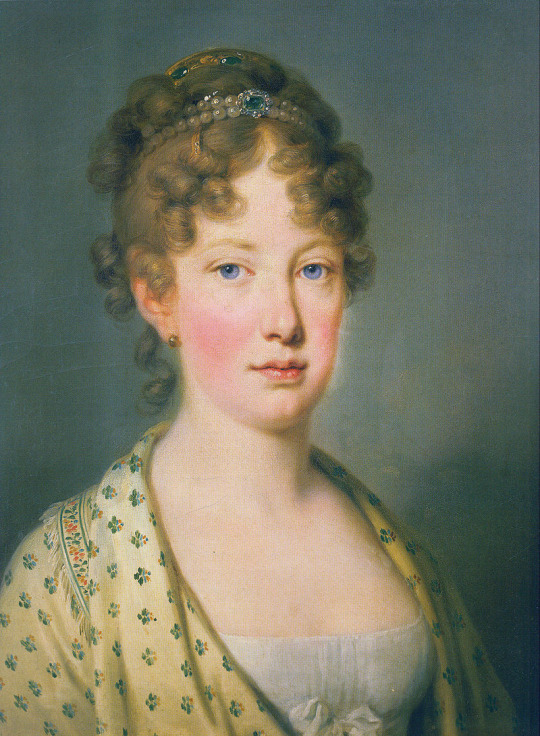
Tenure: 10 March 1826 – 2 May 1826
Maria Leopoldina of Austria (22 January 1797 – 11 December 1826) was an archduchess of Austria, Empress consort of Brazil and Queen consort of Portugal.
She was born Caroline Josepha Leopoldine Franziska Ferdinanda of Habsburg-Lorraine in Vienna, Austria, the daughter of Holy Roman Emperor Francis II,
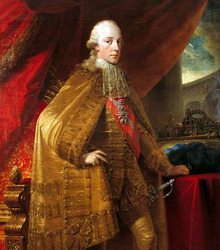
and his second wife, Maria Teresa of Naples and Sicily.
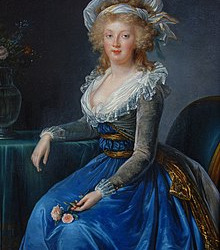
Among her many siblings were Emperor Ferdinand I of Austria
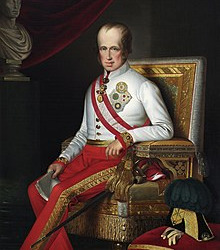
and Marie Louise, Duchess of Parma,
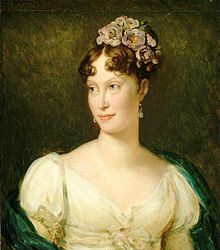
the wife of Napoleon Bonaparte.
Leopoldina was born on 22 January 1797 in Schönbrunn Palace, in Vienna, Archduchy of Austria. She was given the name Caroline Josepha Leopoldine Franziska Ferdinanda, according to her biographer Carlos H. Oberacker, and confirmed by Bettina Kann in her work "Cartas de uma Imperatriz", who mentioned a contemporary source: the Austrian newspaper Wiener Zeitung of 25 January 1797, who gave the news of the birth of the Archduchess three days before with her full name. According to Oberacker, the name "Maria" wasn't present in the preserved baptismal record of the Archduchess, and she began to use it only during her journey to Brazil, where she began to be named Maria Leopoldina in all documents, including the Constitutional oath of 1822. According to another theory presented by Oberacker, the Archduchess probably began to use the name "Maria" due to her great devotion to the Virgin Mary and because all her sisters-in-law used this name.
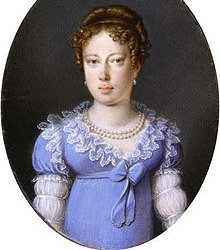
She was raised in accordance with the educational principles laid down by her grandfather, Emperor Leopold II. Among these was the habit of exercising her handwriting by writing the following text:
“Do not oppress the poor. Be charitable. Do not complain about what God has given you, but improve your habits. We must strive earnestly to be good.”
In addition, she and her sisters were taught to speak French and Latin. They were also educated in drawing, piano, riding and hunting. Her mother died when she was ten years old and her father went on to remarry Maria Ludovika of Austria-Este.
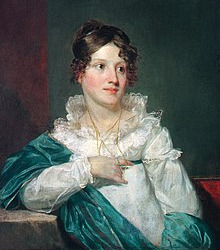
Her late mother was a soprano and Leopoldina had the chance of meeting Johann Wolfgang von Goethe
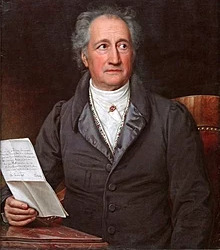
in 1810 and 1812, when she went to Carlsbad with her stepmother. Her passions included natural sciences, especially botany and mineralogy. She was formed according to the three Habsburg principles: discipline, piety and a sense of duty.
Although Maria Theresa of Naples and Sicily was her birth mother, Leopoldina always considered Maria Ludovika d'Este, her stepmother, to be her mother and she grew up with Ludovika as her "spiritual mother".
On 24 September 1816 it was announced by Leopoldina's father that Pedro of Braganza wished to take a Habsburg princess as his wife. Klemens von Metternich suggested that it should be Leopoldina to go get married, as it was "her turn" to become a wife. Two ships were prepared and in April 1817 scientists, painters, gardeners and a taxidermist, all with assistants, travelled to Rio de Janeiro ahead of Leopoldina, whom, in the meantime, studied the history and geography of her future home and learned Portuguese. During these weeks Leopoldina compiled and wrote a vade mecum, a unique document the like of which has never been produced by any other Habsburg princess.
On 13 May 1817 Leopoldina was married to Dom Pedro per procuram (by proxy) in Vienna. At the ceremony the bridegroom was represented by Leopoldina’s uncle, Archduke Charles.
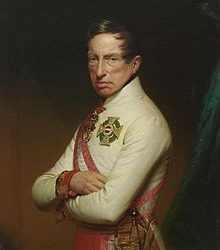
Embarkation took place in Livorno on 13 August 1817
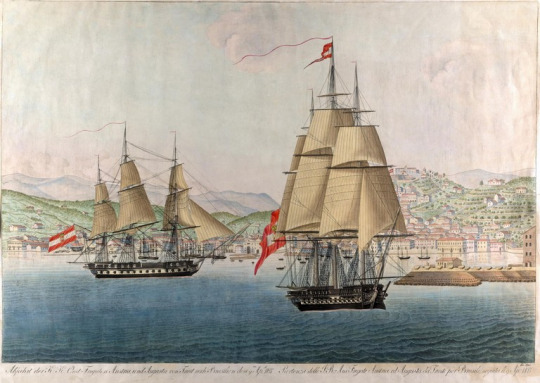
among much celebration, and after an adventure-filled voyage lasting 81 days, Leopoldina arrived in Rio de Janeiro on 5 November and finally met her husband.
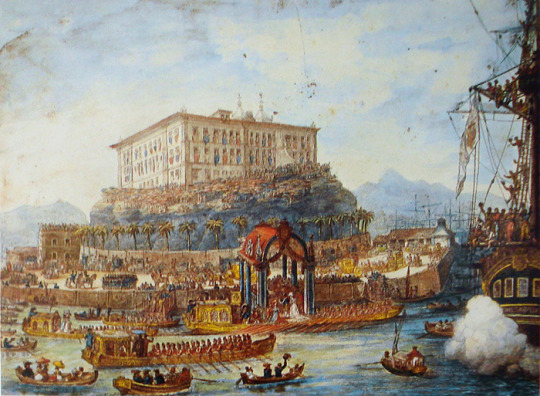
From a distance Pedro initially appeared to Leopoldina to be a perfect, well-educated gentleman, but the reality was very different. Dom Pedro was a year younger than Leopoldina and sadly rarely measured up to the descriptions given by the matchmakers. His temperament was impulsive and choleric, and his education but modest. Even spoken communication between the young married couple proved difficult, as Pedro spoke very little French and his Portuguese could only be described as vulgar.
In keeping with Portuguese tradition, at the age of eighteen Pedro of Bragança not only had a string of amorous adventures behind him and was principally interested in horse racing and love affairs, but in 1817 (the year of his marriage to Leopoldina) he was living as if in wedlock with French dancer Noemie Thierry, who was finally removed from the court by his father a month after Leopoldina's arrival in Rio de Janeiro.
The young married couple took up residence in six relatively small rooms in the Palace of São Cristóvão. The inner courtyard and path to the stables were unpaved and the tropical rainfall quickly turned everything to mud. There were insects everywhere, including in their clothing, for the uniforms and court regalia made of velvet and plush rotted and turned mouldy in the heat and humidity.
On 25 April 1821, the court returned to Portugal. A fleet of 11 ships took the king, the court, the royal house and the royal treasury, and only Prince Pedro remained in Brazil as regent of the country, with ample powers counterbalanced by a regency council. At first Pedro was incapable of dominating the chaos: the situation was dominated by the Portuguese troops, in anarchic conditions. The opposition between Portuguese and Brazilians became increasingly evident. It is clear from Leopoldina's correspondence that she has warmly espoused the cause of the Brazilian people and even desired the independence of the country and is therefore loved and venerated by the Brazilians.
According to Ezekiel Ramirez, below, the signs of a nascent Brazilian unit as an independent nation in the southern provinces were visible, but the north supported the Lisbon Cortes and called for regional independence. If the Prince Regent had left the country at that moment, Brazil would be lost to Portugal because the courts of Lisbon repeated the same error that led the Spanish courts to lose the colonies, seeking to establish direct contacts with each province in particular.
In Rio, thousands of signatures collected required the regents to remain in Brazil. "José Bonifácio de Andrada e Silva's courageous attitude toward Portuguese arrogance greatly encouraged the aspirations for unity that existed in the southern provinces, especially in São Paulo. A highly educated men led this movement." After Fico's day, 9 January 1822, a new ministry was organized under the leadership of José Bonifácio, "strictly monarchist", and the Prince Royal soon won the trust of the people. On 15 February 1822 the Portuguese troops left Rio, and their departure represented the dissolution of the ties between Brazil and the metropolis. The prince was triumphantly received in Minas Gerais.
When her husband, prince regent, traveled to São Paulo in August 1822 to pacify politics (which culminated in the proclamation of Brazil's independence in September), Leopoldina exercised the regency. Great was his influence in the process of independence. The Brazilians were already aware that Portugal intended to call Pedro back, relegating Brazil again to the status of a simple colony rather than a kingdom united to that of Portugal. There were fears that a civil war would separate the Province of São Paulo from the rest of Brazil. Pedro gave power to Leopoldina on 13 August 1822, appointing her head of the Council of State and Acting Princess Regent of the Kingdom of Brazil, with legal powers to govern the country during his absence and set out to appease São Paulo.
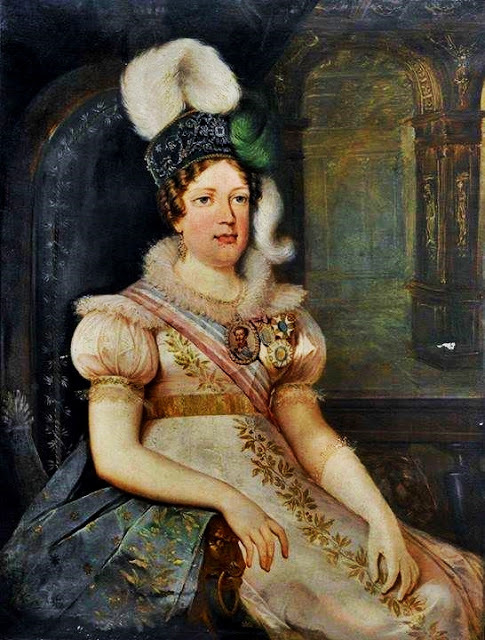
The Princess received news that Portugal was preparing action against Brazil and, without time to wait for Pedro's return, Leopoldina, advised by José Bonifácio de Andrada e Silva, and using his attributes as interim head of government, met in the morning of 2 September 1822, with the Council of State, signing the decree of Independence, declaring Brazil separate from Portugal. The Princess sends Pedro a letter, along with another letter from José Bonifácio, as well as comments from Portugal criticizing the actions of her husband and King João VI. It demands that Pedro proclaim the Independence of Brazil and, in the letter, warns: "The pommel is ripe, pick it up already, or it will rot."
The officer arrived at the prince on 7 September 1822. Leopoldina had also sent papers received from Lisbon, and comments from Antônio Carlos Ribeiro de Andrada, deputy to the courts, for which the Prince-Regent learned of criticism of him in the metropolis. The position of João VI and all his ministry, dominated by the courts, was difficult.
While awaiting the return of Pedro, Leopoldina, the interim ruler of an already independent Brazil, idealized the flag of Brazil, in which she mixed the green of the House of Bragança and the golden yellow of the House of Habsburg. Other authors say that Jean-Baptiste Debret, the French artist who designed what he saw in Brazil in the 1820s, was the author of the national pavilion that replaced that of the old Portuguese court, symbol of the oppression of the old regime. Debret is the design of the beautiful imperial flag, in collaboration with José Bonifácio de Andrada e Silva, in which the green rectangle of the Bragança represented the forests and the yellow rhombus, color of the Habsburg-Lorraine dynasty, represented the gold.
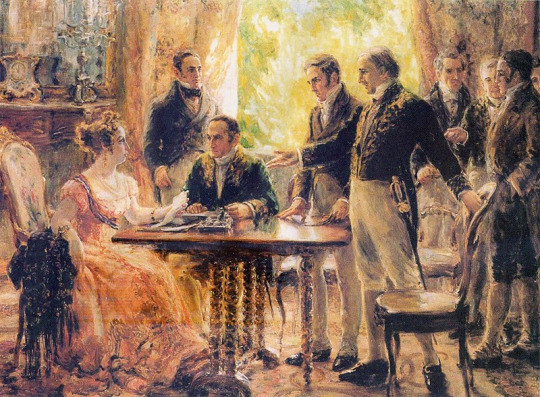
Maria Leopoldina became Brazil's first empress consort. She also played an important role in the process of issuing a Declaration of Independence. On 2 September 1822, a new decree with demands from Lisbon arrived in Rio de Janeiro, while Prince Pedro was in São Paulo.
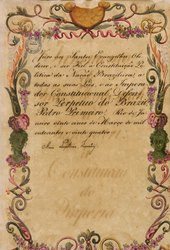
Leopoldina, advised by José Bonifácio, and using her power as Princess Regent, met on 2 September 1822 with the Council of Ministers. She decided to send her husband the news along with a letter advising him to declare Brazil's independence and warned him, "The fruit is ready, it's time to harvest." Prince Pedro declared the country's independence upon receiving the letter on 7 September 1822.
When his father, João VI, died on 10 March 1826, Pedro inherited the Portuguese throne as King Pedro IV, while remaining Emperor Pedro I of Brazil. Maria Leopoldina thus became both Empress consort of Brazil and Queen consort of Portugal. However, two months later, Pedro was forced to give up the Portuguese throne to their seven-year-old daughter Maria.
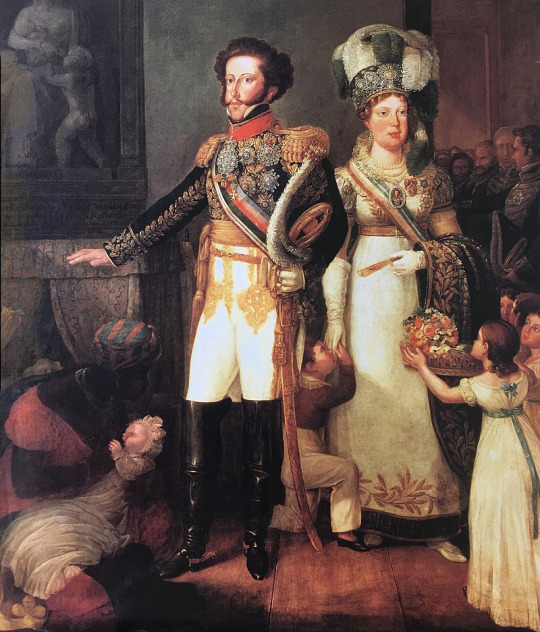
At the end of November 1826, Pedro traveled to Cisplatina (now Uruguay) to join his soldiers. To mark the occasion there was a large farewell reception on 20 November 1826, and Pedro demanded that both women, Maria Leopoldina and his official mistress Domitila de Castro, Marchioness of Santos, appear together before the ecclesiastical and diplomatic dignitaries and receive his kiss on the hand. With the fulfillment of this demand, Maria Leopoldina would have officially recognized her husband's mistress, and for this she refused to appear at the reception. This caused a bitter argument with Pedro, who departed with no resolution to the situation.
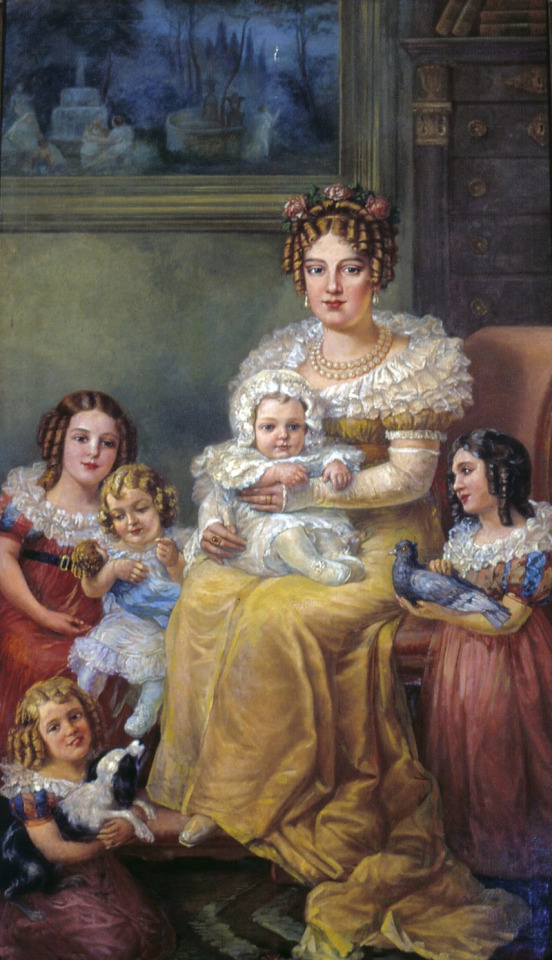
Shortly after, Maria Leopoldina became ill, had spells of fever, became delirious at times, and then suffered a miscarriage on 2 December 1826. She died eight days later, on 11 December, five weeks before her thirtieth birthday. She was buried on 14 December 1826 in Rio de Janeiro, in the church of the Ajuda Convent.
Maria Leopoldina had seven children with her husband King Pedro IV of Portugal:
Maria II of Portugal (4 April 1819 –15 November 1853) Queen of Portugal from 1826 until 1853. Maria II's first husband, Auguste de Beauharnais, 2nd Duke of Leuchtenberg, died a few months after the marriage. Her second husband was Prince Ferdinand of Saxe-Coburg and Gotha, who became King Dom Fernando II after the birth of their first child. She had eleven children from this marriage. Maria II was heir to her brother Pedro II as Princess Imperial until her exclusion from the Brazilian line of succession by law no. 91 of 30 October 1835.
Miguel, Prince of Beira (26 April 1820) Prince of Beira from birth to his death.
João Carlos, Prince of Beira (6 March 1821 – 4 February 1822) Prince of Beira from birth to his death.
Princess Januária of Brazil (11 March 1822 – 13 March 1901) Married Prince Luigi, Count of Aquila, son of Don Francesco I, King of the Two Sicilies. She had four children from this marriage. Officially recognized as an Infanta of Portugal on 4 June 1822, she was later considered excluded from the Portuguese line of succession after Brazil became independent.
Princess Paula of Brazil (17 February 1823 – 16 January 1833) She died age 9, probably of meningitis. Born in Brazil after its independence, Paula was excluded from the Portuguese line of succession.
Princess Francisca of Brazil (2 August 1824 – 27 March 1898) Married Prince François, Prince of Joinville, son of Louis Philippe I, King of the French. She had three children from this marriage. Born in Brazil after its independence, Francisca was excluded from the Portuguese line of succession.
Pedro II of Brazil (2 December 1825 –5 December 1891) Emperor of Brazil from 1831 until 1889. He was married to Teresa Cristina of the Two Sicilies, daughter of Don Francesco I, King of the Two Sicilies. He had four children from this marriage. Born in Brazil after its independence, Pedro II was excluded from the Portuguese line of succession and did not become King Dom Pedro V of Portugal upon his father's abdication.
14 notes
·
View notes
Photo








Elisabeth Alexandra Gabriella Annunciata Charlotte Teresa
As the daughter of a Habsburg, Elisabeth was given the name Teresa. The most famous of which was Empress Maria Theresa, the last of the House of Habsburg and the real power of the Holy Roman Empire under her husband Francis I.
The given name of Maria Theresa had been in the Habsburg family since the 17th century. Maria Theresa of Spain was the wife of King Louis XIV and through him, gave their grandson a claim to the Spanish throne bringing the Bourbons to Spain. Since then, almost every Maria Theresa has left their mark in history.
Empress Maria Theresa’s granddaughter Maria Theresa of Naples and Sicily married her double first cousin giving birth to almost a dozen children. Her children were an Emperor of Austria, Empress of the French, Empress of Brazil & Queen of Portugal and a Crown Princess of Saxony.
Mother and daughter, Maria Theresa of Austria-Este and Maria Theresa of Savoy married Italian Bourbons. The mother was Queen of Sardinia and the other was Duchess of Parma. It is through Felix, Prince Consort of Luxembourg and Empress Zita of Austria that Maria’s Theresa descendants are still in reigning monarchies.
Another Maria Theresa of Savoy was the grandmother of the last Duchess of Parma, Louise Marie Therese. Her husband, Louis XIX of France became king over two decades after her death meaning Maria Theresa never got the title Queen of France.
The most recent Maria Theresa to become Queen was Maria Theresa of Austria, Queen of the Two Sicilies. Like Habsburgs and Bourbons before her, Maria Theresa married her children into the Bourbon-Parma family and Austria Imperial Family.
Maria Theresa, Grand Duchess of Luxembourg was the first of the Americas. As a Cuban, Maria Theresa was the beginning of marriages to commoners in European royalty. As a great-aunt of Lady Elisabeth, Maria Theresa greatly influenced Elisabeth’s life and that of her sister, Alice. The two girls eventually converted to Catholicism.
9 notes
·
View notes
Photo
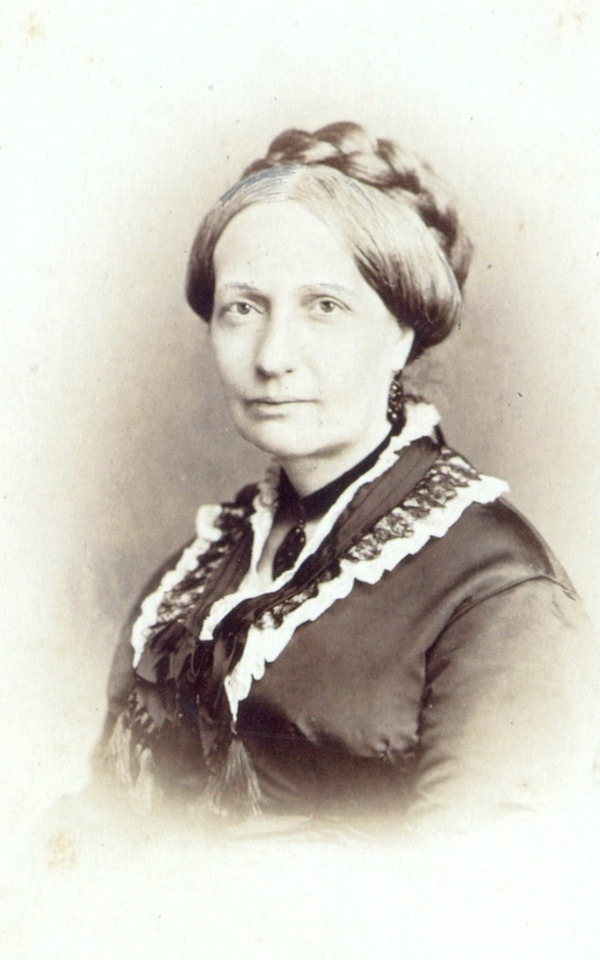
Theresa Christina of the Two Sicilies, Empress of Brazil (14 March 1822 - 28 December 1889)
#theresa christina of the two sicilies#teresa cristina maria giuseppa gaspare baltassare melchiore gennara francesca de padova donata bonosa andrea d'avelino rita luitgarda geltr#empress of brazil#daughter of francis i of the two sicilies#wife of pedro ii of brazil#history#women in history#19th century#photography
2 notes
·
View notes